Of all the places we’ve traveled, Bansko has been one of the hardest destinations to be vegan. Bulgaria as a whole is not especially known for plant-based eating, and here in the mountains it’s clear that meat, dairy, and eggs are central to the local cuisine. If Chiang Mai or Hội An feel like vegan paradises, Bansko feels more like survival mode. You don’t come here for the food if you’re plant-based—you come for the mountains, the skiing, the hiking, and the atmosphere of a small alpine town. Eating vegan becomes less about abundance and more about cobbling together what you can.
That said, it isn’t impossible. Some traditional Bulgarian foods can be vegan by default or with small adjustments. Vegetable sach is a good example: a sizzling clay platter of grilled peppers, onions, zucchini, and mushrooms that arrives hearty, smoky, and naturally plant-based. Lutenitsa—a roasted red pepper and tomato spread you’ll find everywhere—is another staple, and one we’ve grown to love slathered on bread. Bean soup (bob chorba) is a classic that’s usually vegan, simple but filling, and often served as a starter in traditional restaurants. Even the bread (parlenka) can be made vegan if you ask for oil instead of butter brushed on top.
Beyond that, there are a few bright spots worth noting. In town, one bakery makes a vegan version of banitsa, the traditional Bulgarian pastry usually layered with cheese and egg. A local grocery chain, Grosh, stocks some specialty vegan items—plant-based cheeses, alternative milks, and a few imported products—that can make cooking at home much easier if you have access to a kitchen. These finds can feel like small victories in a place where veganism isn’t the norm.
But ultimately, the truth is simple: you don’t come to Bansko for a culinary vegan experience. Plant-based eating here requires lowering expectations, getting creative with side dishes, and celebrating the handful of traditional foods that are naturally vegan. What follows are some of the spots we’ve found that make eating here a little easier, even if the options are limited.
Lubanitza
One of our favorite discoveries in Bansko is Lubanitza, a small bakery-café that has become a reliable stop for something a little more exciting than grilled vegetables or bean soup. Here you can find a vegan version of banitsa—the classic Bulgarian pastry usually made with egg and cheese. Their take is hearty and flavorful, filled with chickpea, zucchini, sun-dried tomato, and vegan pesto, all wrapped in crisp, golden layers of dough. It’s a rare treat to be able to enjoy a local specialty in a fully plant-based version, and it’s the kind of thing we’ve come back for again and again.
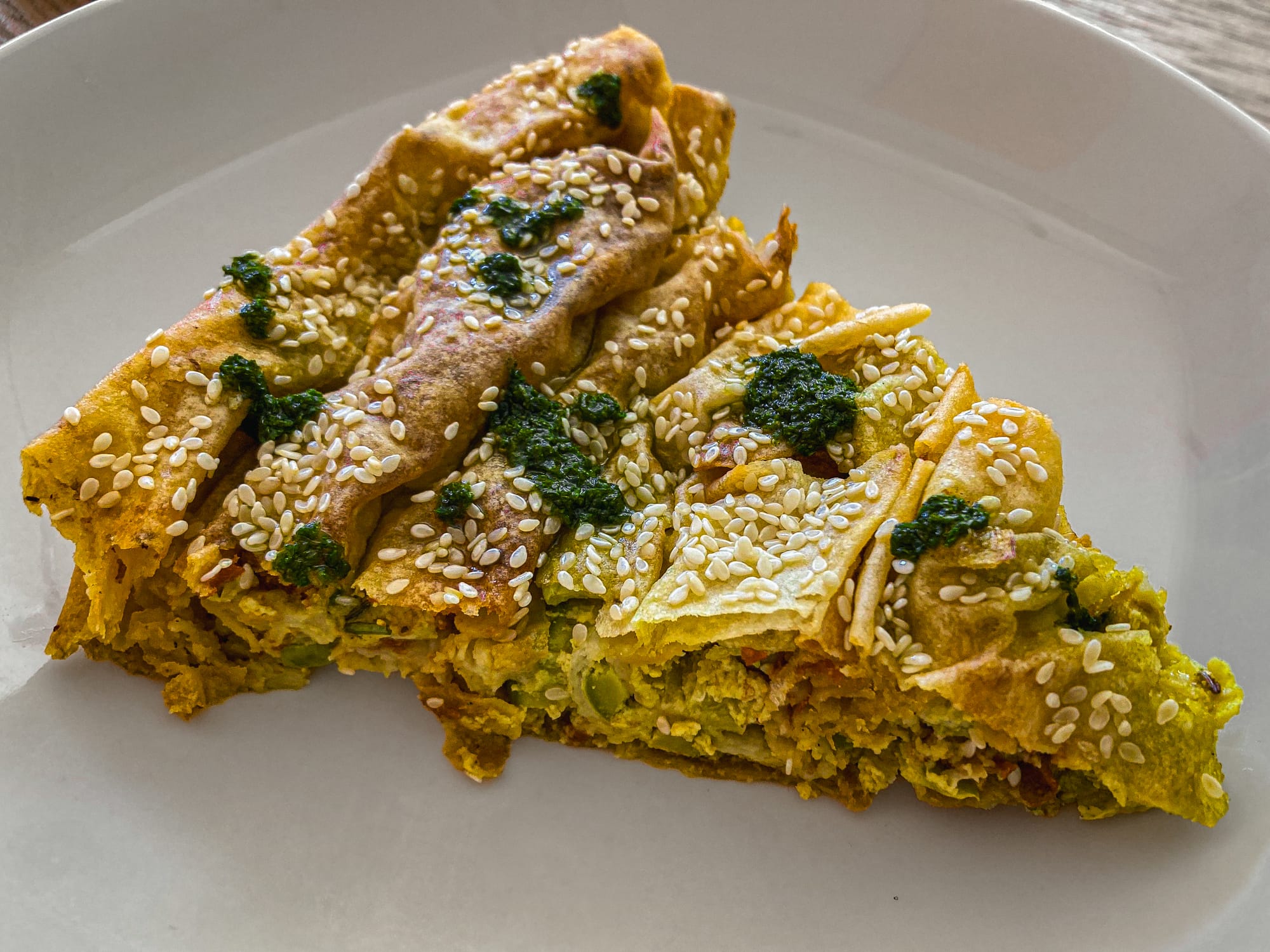
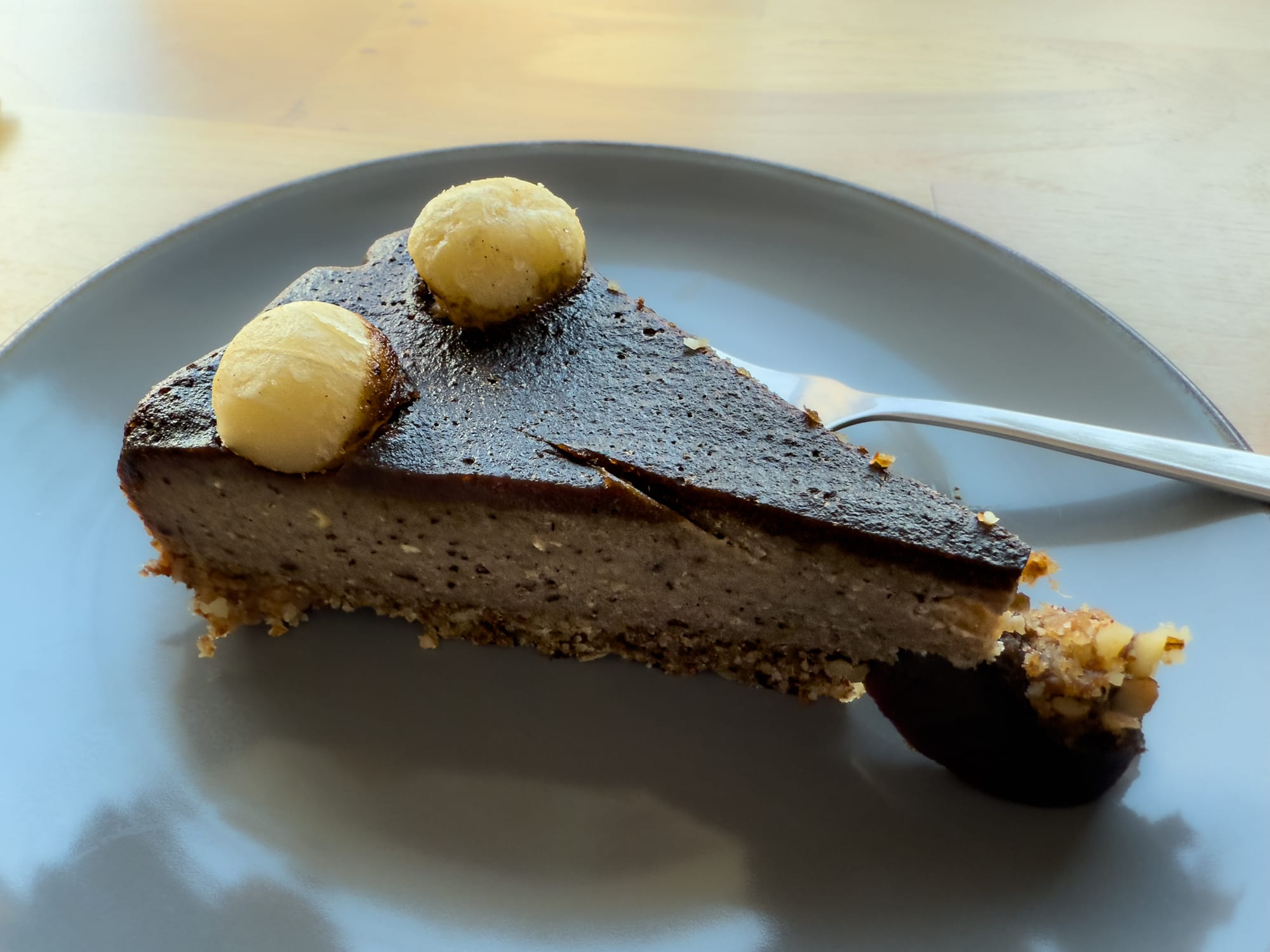
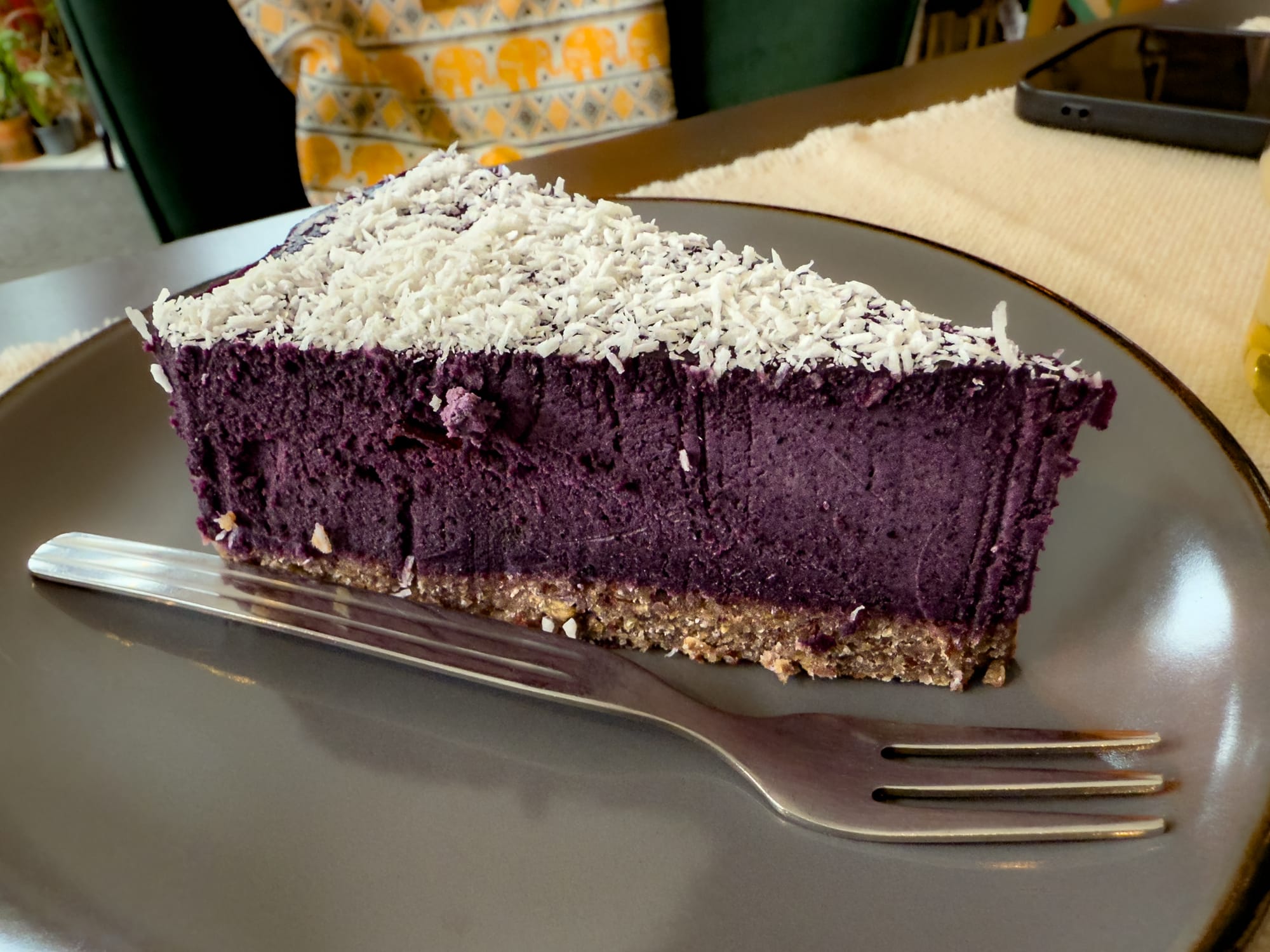
Vegan banitsa and raw vegan cakes: chai with macadamias, and blueberry coconut
Beyond the banitsa, Lubanitza usually has a few raw vegan cakes in the display case—rich, nutty, and sweet without being heavy—as well as a solid selection of plant-based milks for coffee or smoothies. It’s not a fully vegan spot, but it’s one of the few places in Bansko where plant-based options feel intentional rather than incidental. For us, Lubanitza has become a little anchor point in town: a place to grab something filling, satisfying, and unmistakably Bulgarian in spirit, without compromise.
Chalet Yanitza
Just a short walk from Nestwork, Chalet Yanitza has become one of our go-to spots for vegan-friendly meals in Bansko. While the menu isn’t fully plant-based, they almost always have something vegan on offer, which already makes it stand out in town. Portions are generous, prices are fair, and the owner is genuinely warm and welcoming, which makes eating here a pleasure even before the food arrives.
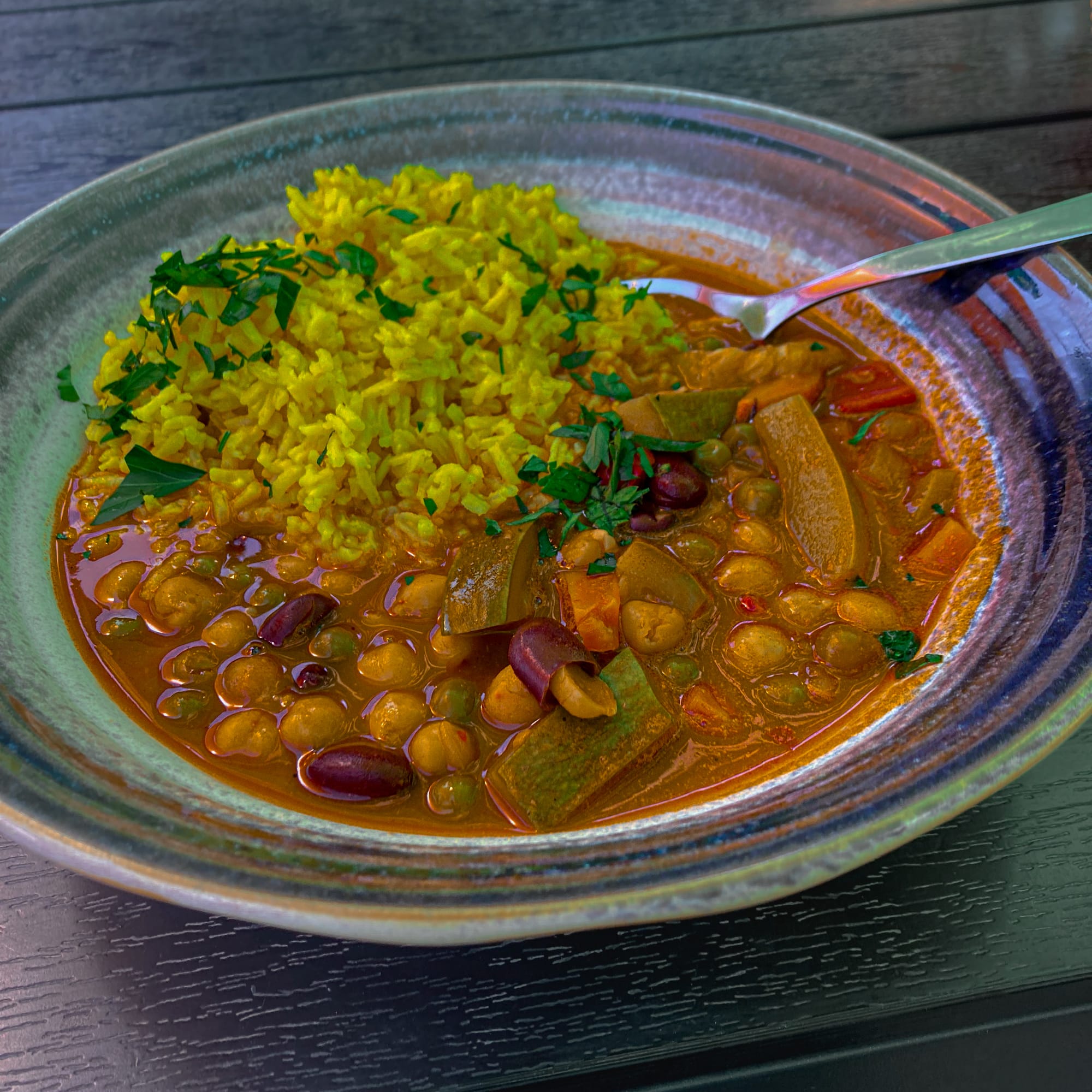
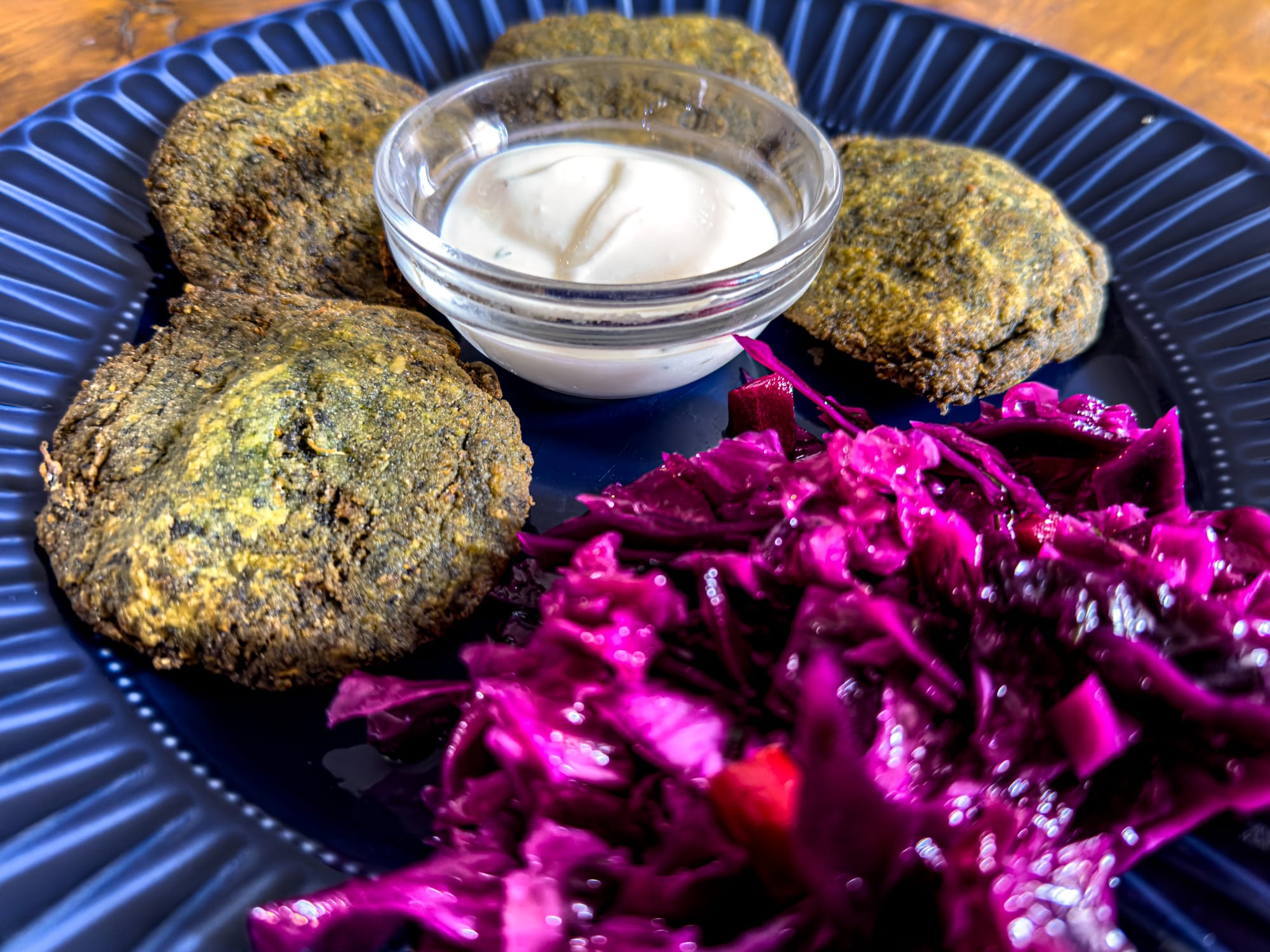
Vegan chickpea curry and spinach patties from Chalet Yanitza
Our favorites include their chickpea curry served with fluffy basmati rice, and their vegan spinach patties paired with a homemade pickled cabbage that tastes like a rustic, house-made sauerkraut. Both are hearty and satisfying, the kind of plates that feel wholesome without being bland. When it’s available, their vegan moussaka is another highlight, a rare find in Bulgaria and one we recommend jumping on if you spot it on the menu.
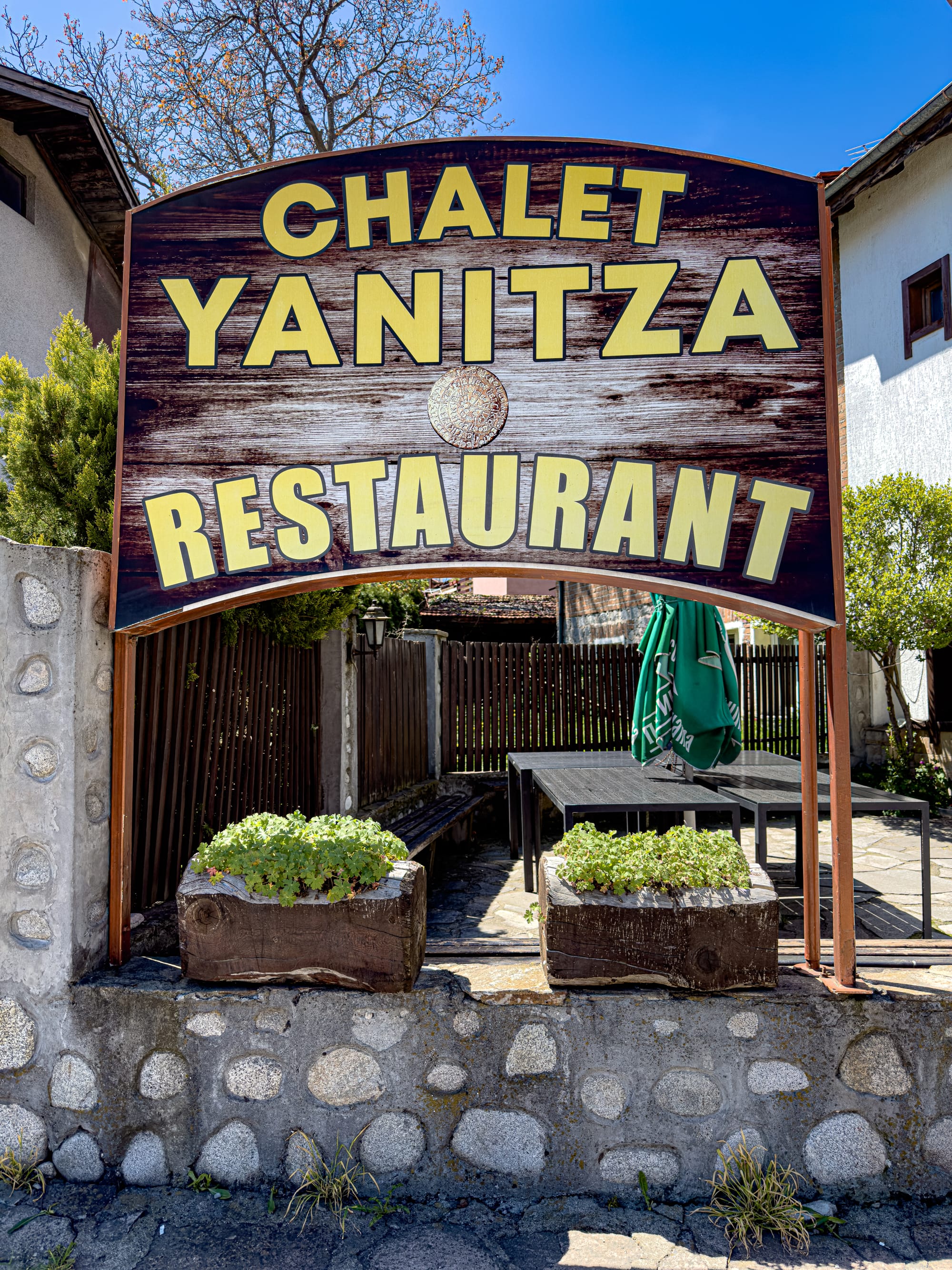
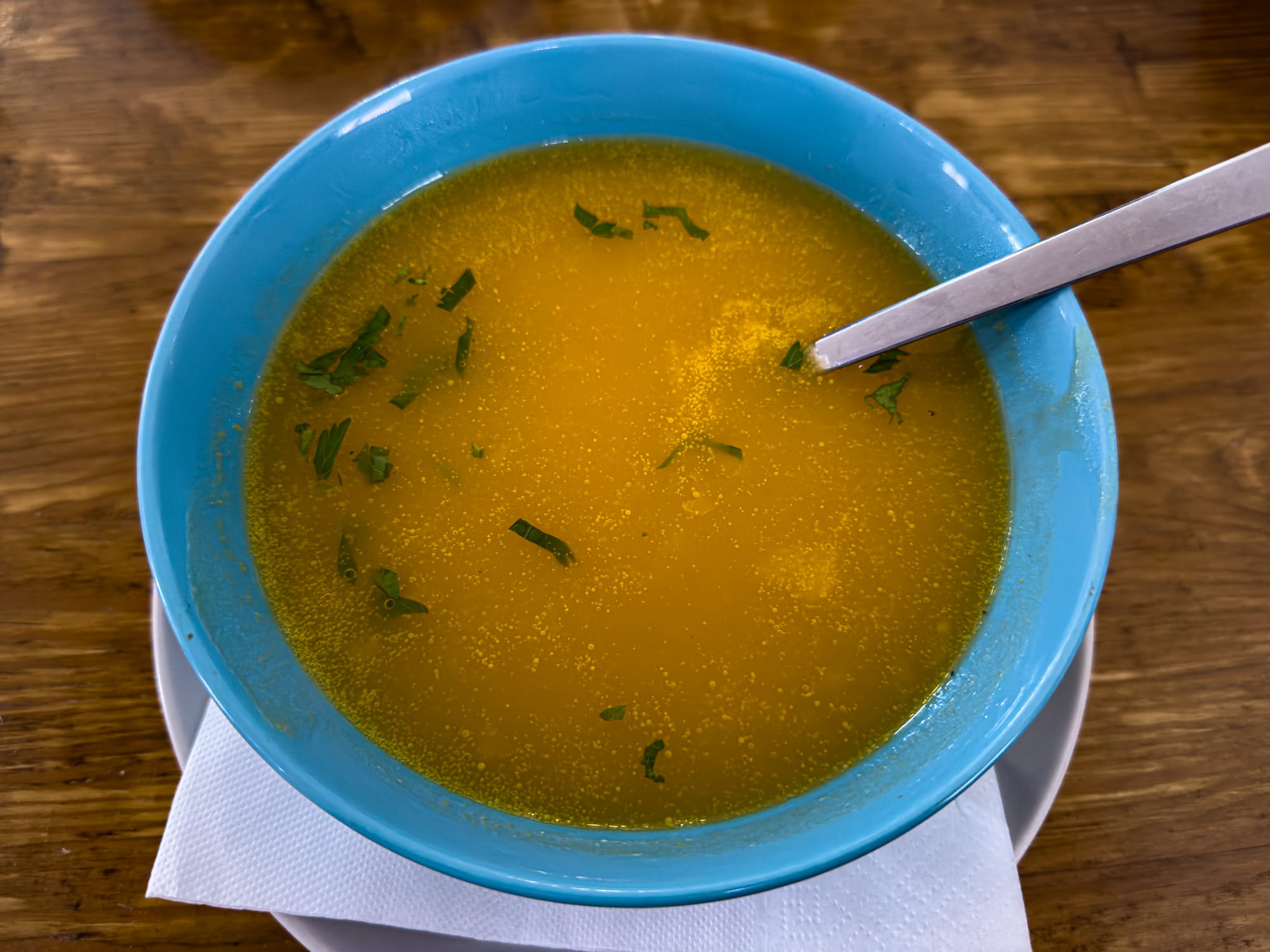
Vegan pumpkin soup from Chalet Yanitza
Chalet Yanitza also makes a lovely pumpkin soup, silky and lightly spiced, which has been the perfect starter on cooler mountain days. Between the curry, patties, soups, and occasional specials, it’s one of the few places in Bansko where vegan food doesn’t feel like an afterthought.
The French Guy
The French Guy is a tiny microbakery that has quickly become one of Bansko’s local gems. Run by Christian, an actual French guy, it’s the kind of place where you step inside and are instantly surrounded by the comforting smell of fresh bread baking. The space itself is cozy, with a lovely garden out back that makes it just as nice for lingering as it is for grabbing a loaf to go. We’ve even enjoyed working from here on quiet mornings, laptop open while the sourdough comes out of the oven.
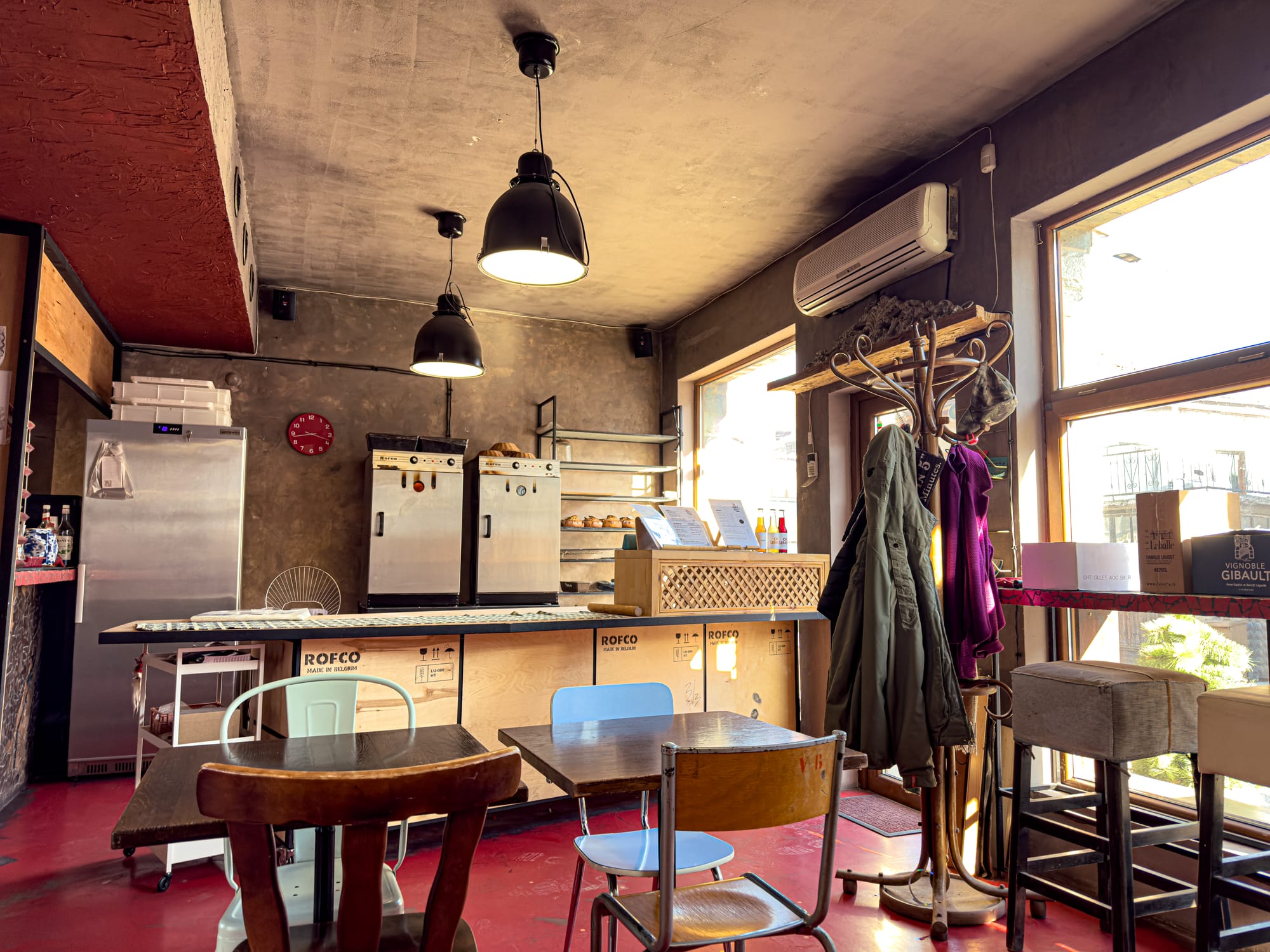
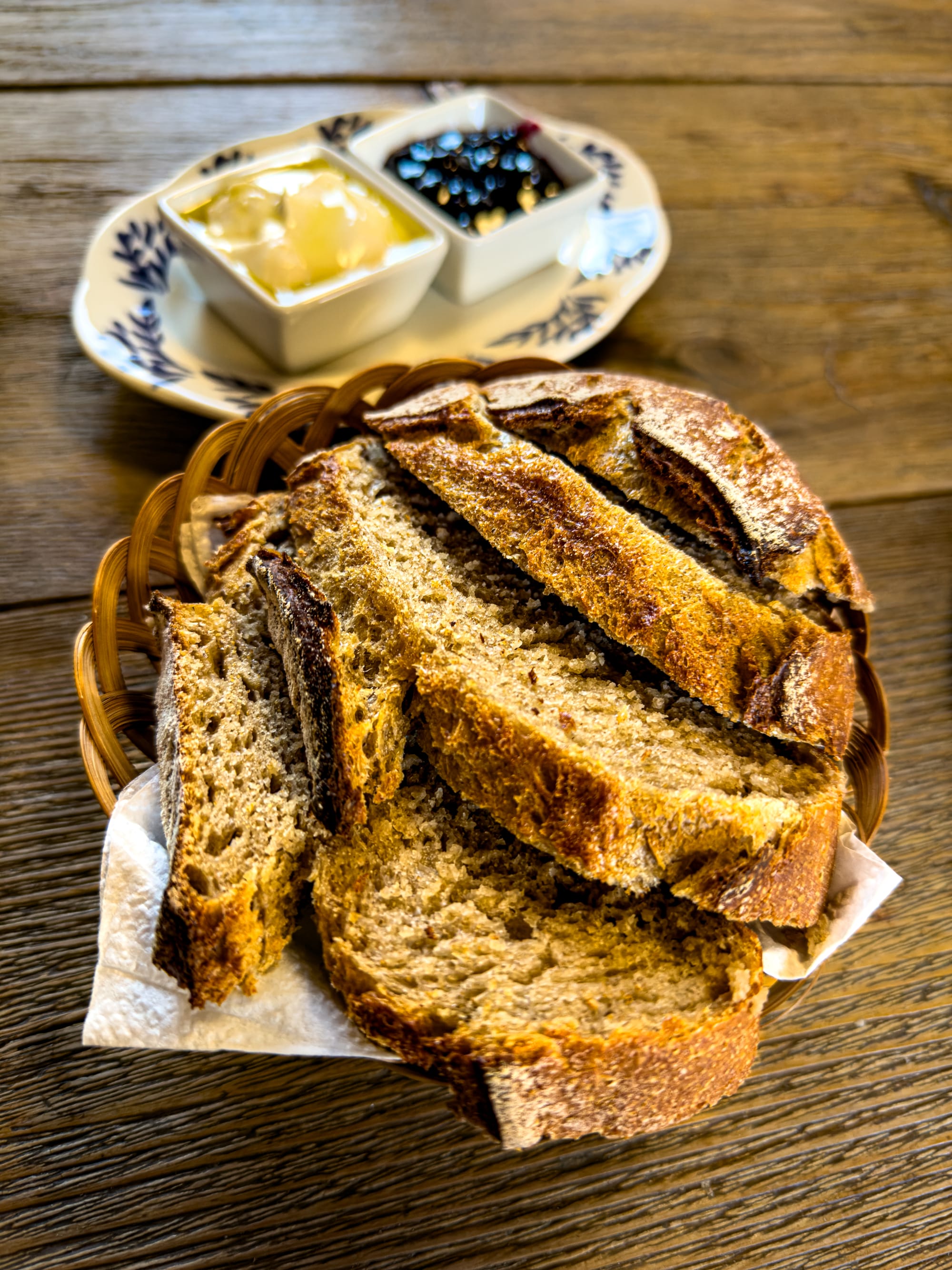
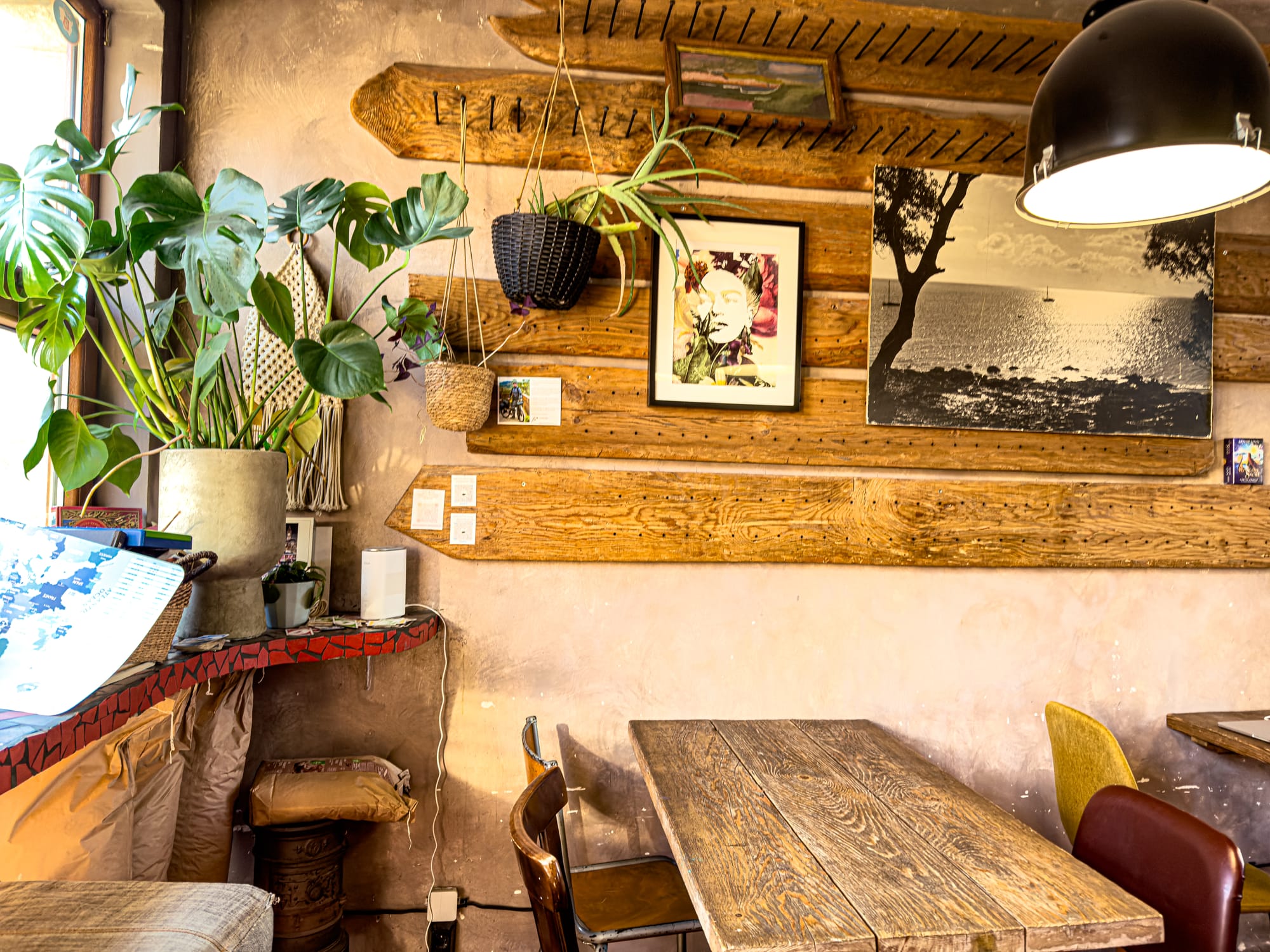
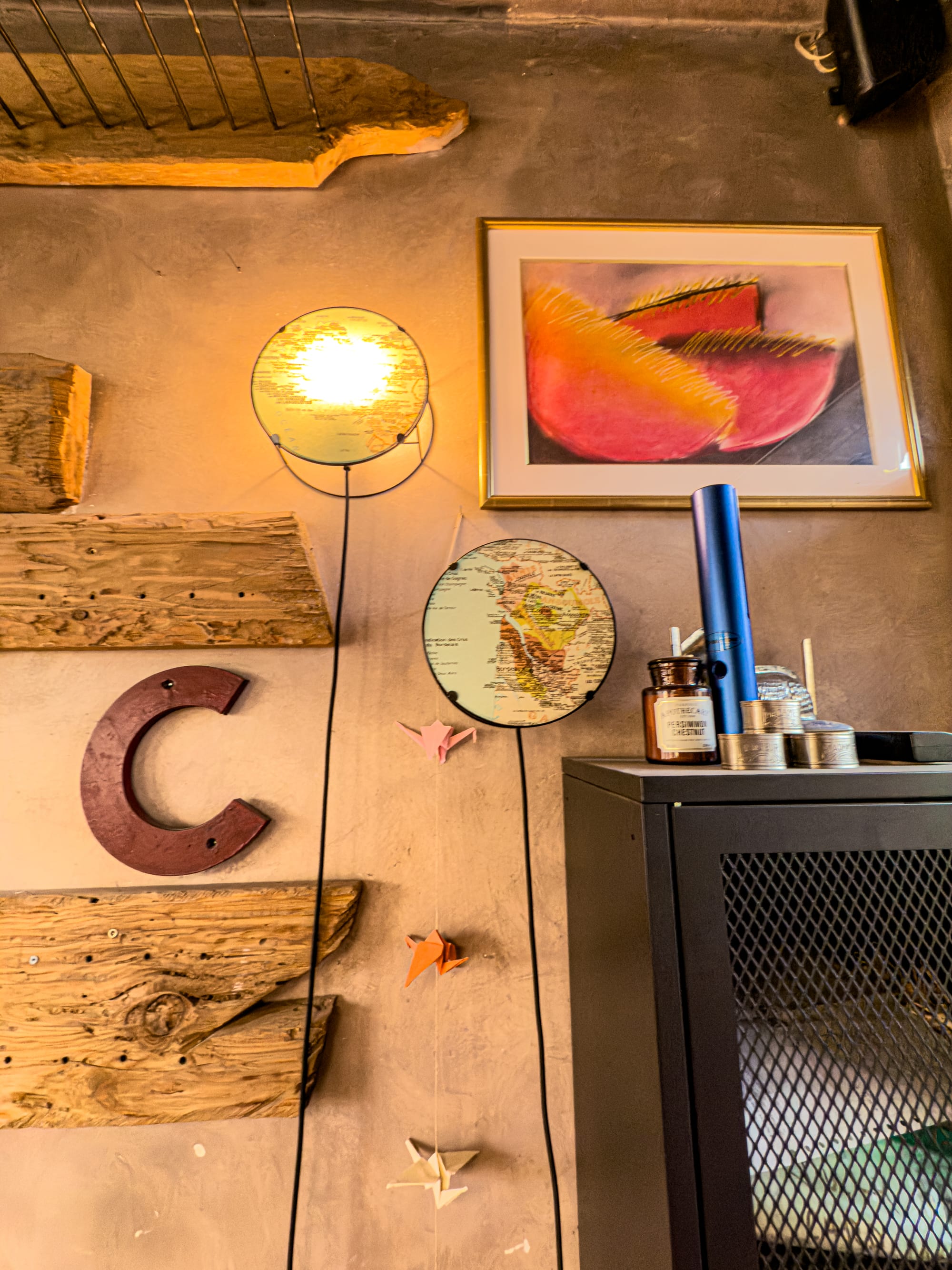
The interior of The French Guy is lovely and calming
While not a fully vegan café, most of the breads are vegan by default, including their fantastic sourdough loaves. You can order slices on their own, or have them served simply with hummus or local jams. A surprise favorite of ours is the cacao loaf, made with vegan cacao and rich enough to feel like a treat without being too sweet. It’s one of those things you don’t expect to find in a small mountain town, but quickly becomes part of your routine once you know it’s there.
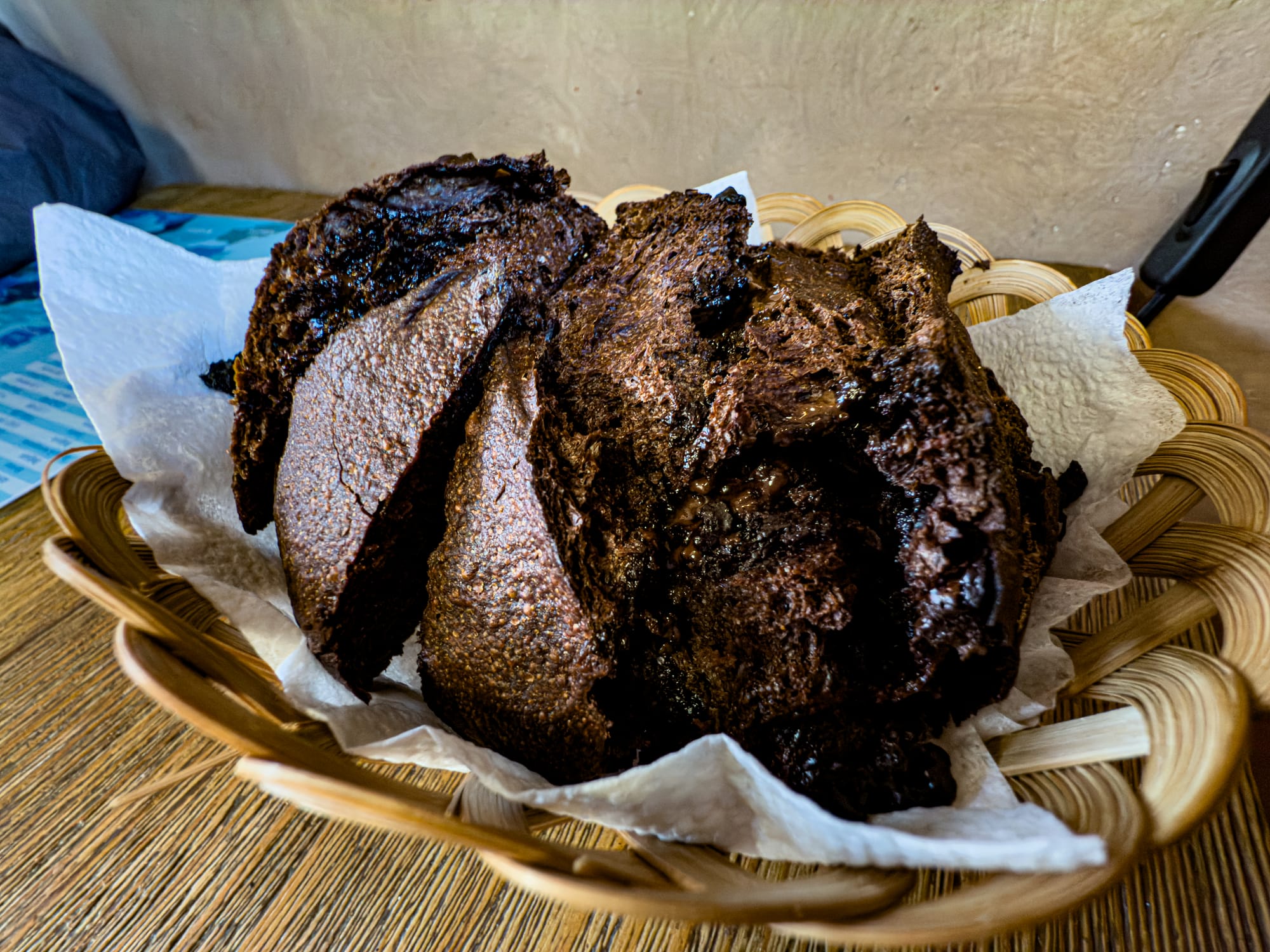
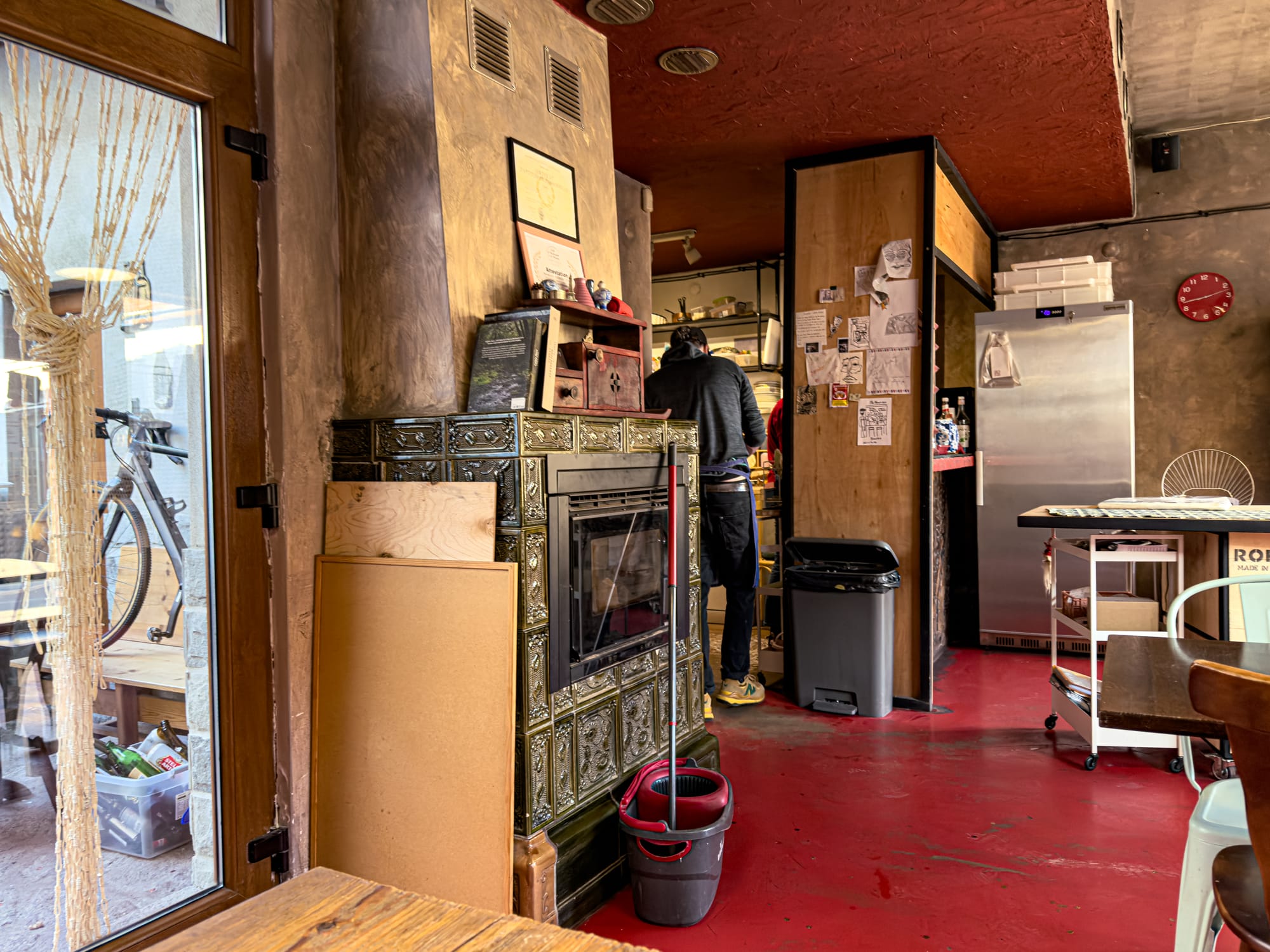
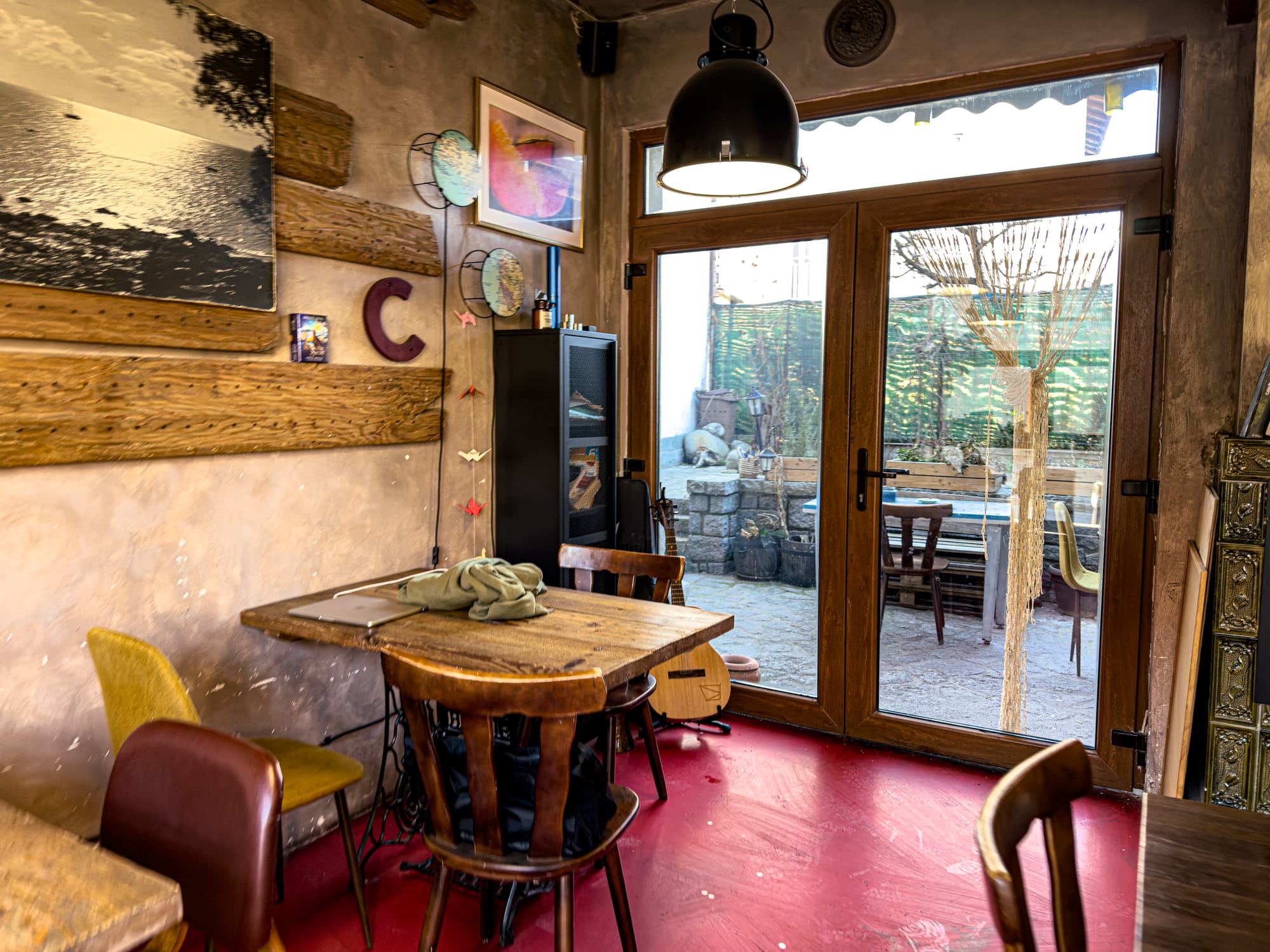
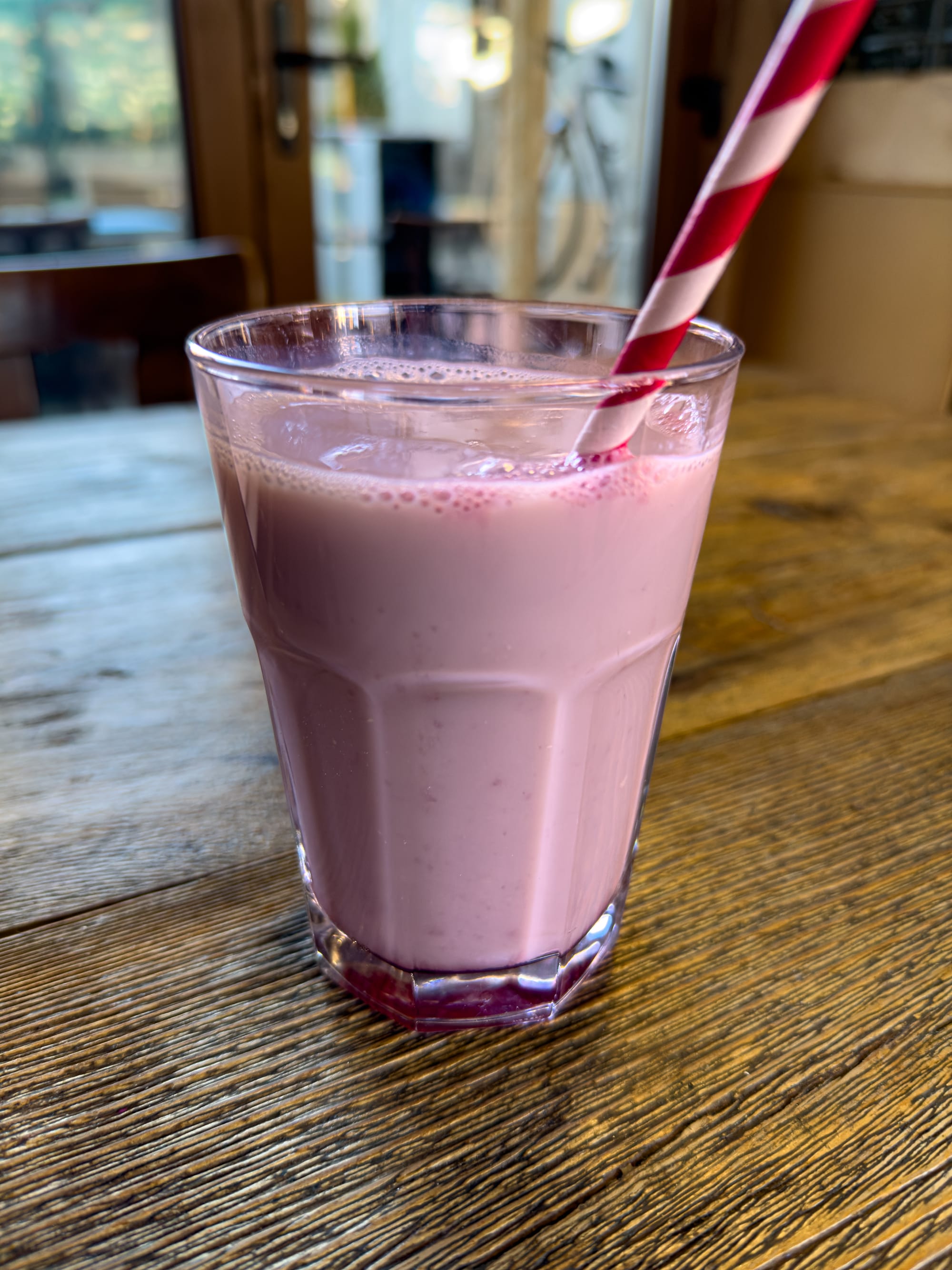
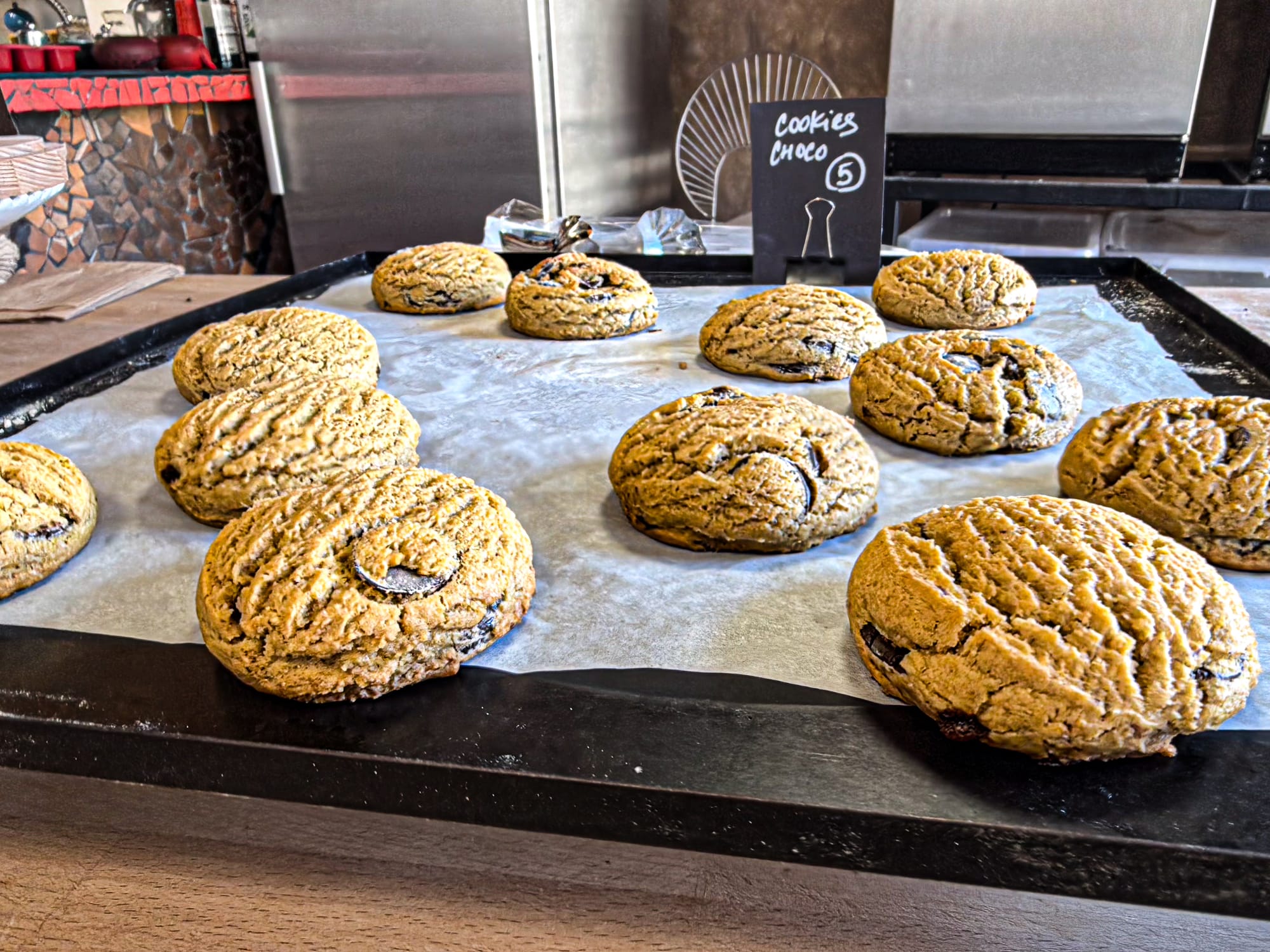
The cookies were not vegan sadly, but they looked delicious
Beyond bread, they also sometimes offer an oat milk strawberry drink made with local strawberry syrup, which pairs nicely with a slice of toast and adds something refreshing to the menu. The French Guy is a perfect spot to stock up on bread for the week, but it’s equally enjoyable to sit in the garden, savor a few slices, and enjoy the warmth of a place built entirely around good bread.
Bulgarian vegan dishes to look out for
There are some traditional Bulgarian dishes that you can pretty much find at any mehana (a local Bulgarian tavern).
Stepping into a mehana feels like stepping into a particular kind of Bulgarian coziness. Interiors are almost always rustic and heavy with wood, with stone fireplaces, embroidered tablecloths, and folkloric decorations hanging from the walls—old tools, painted ceramics, copper pans.
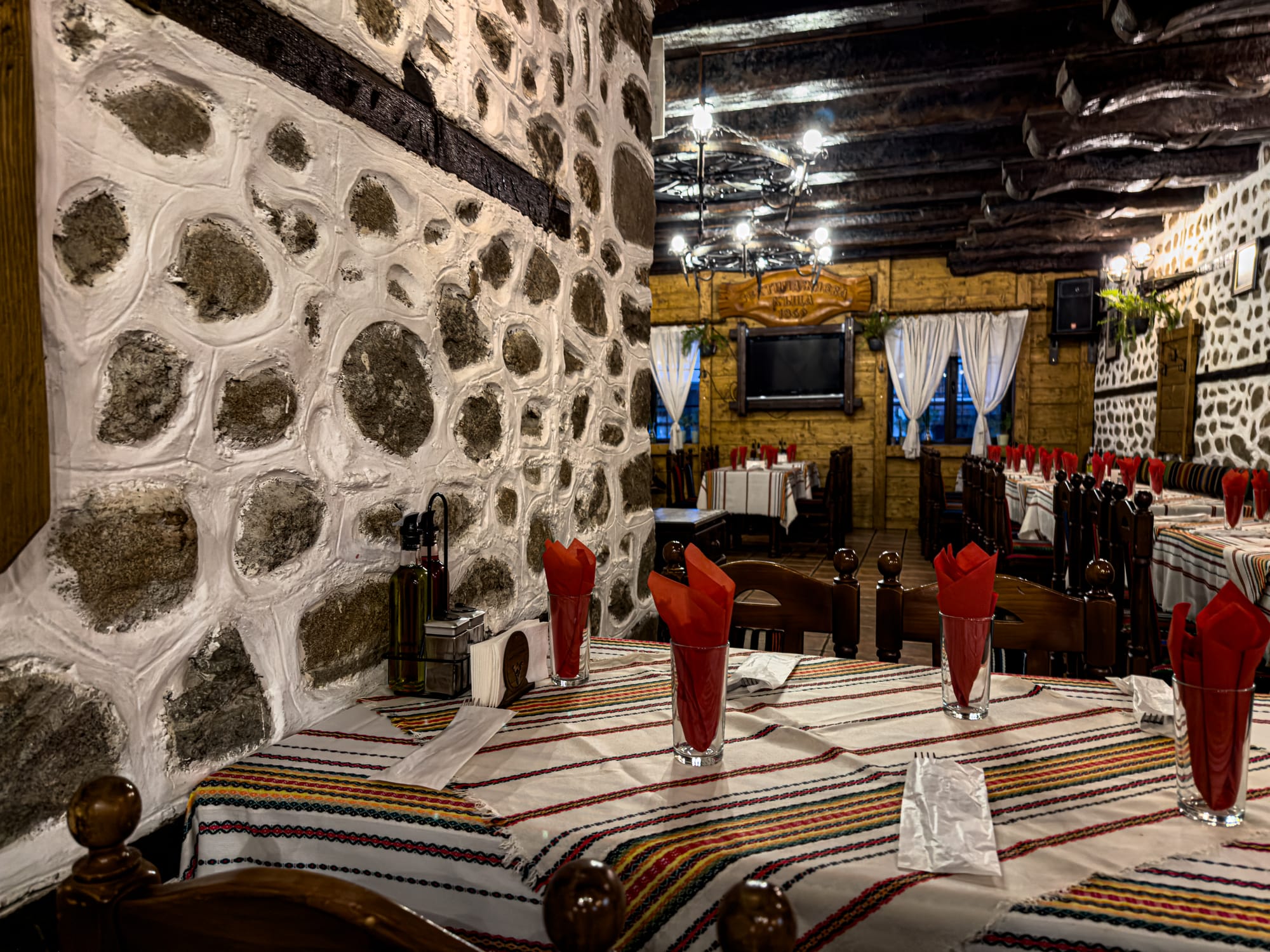
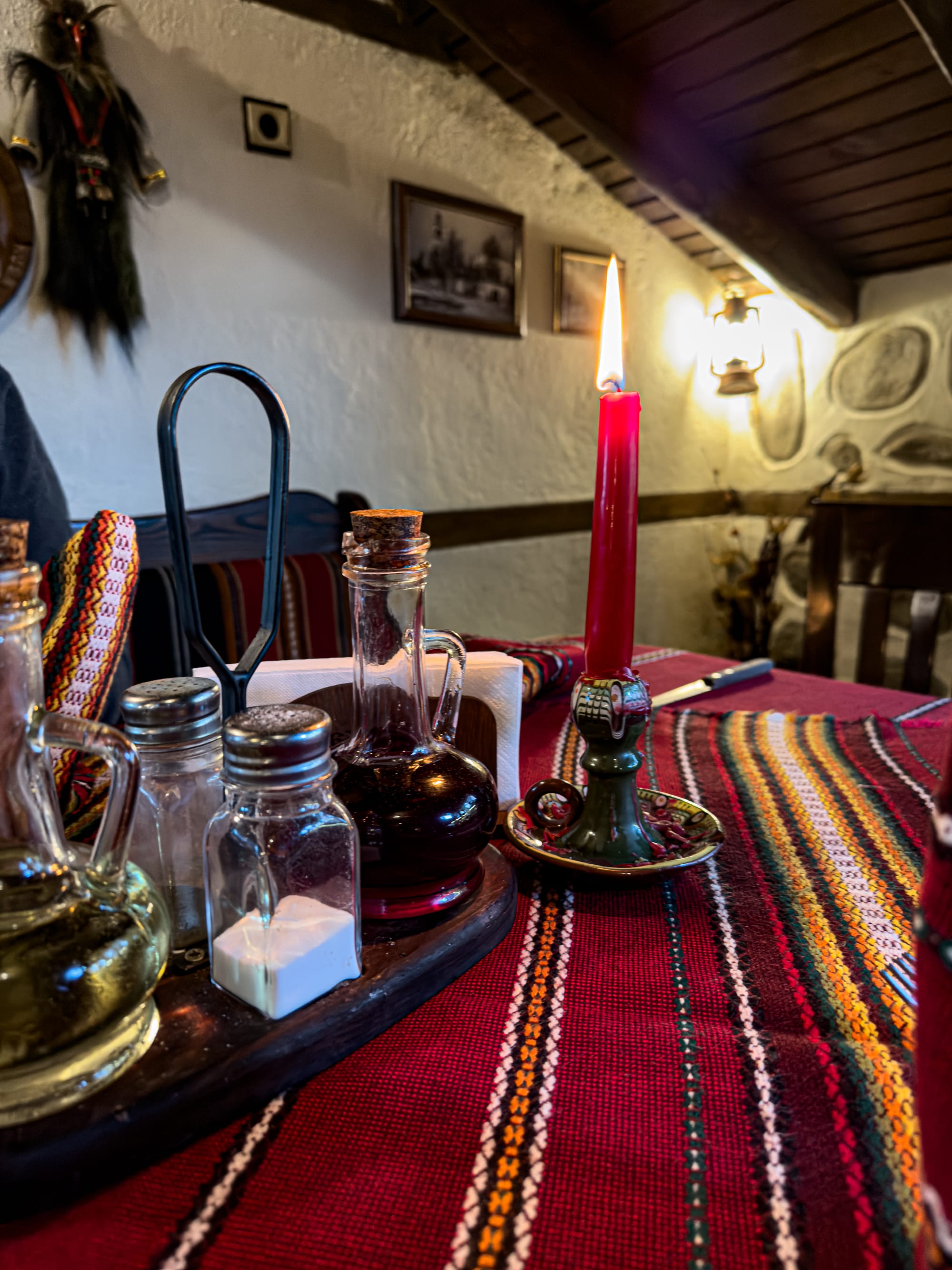
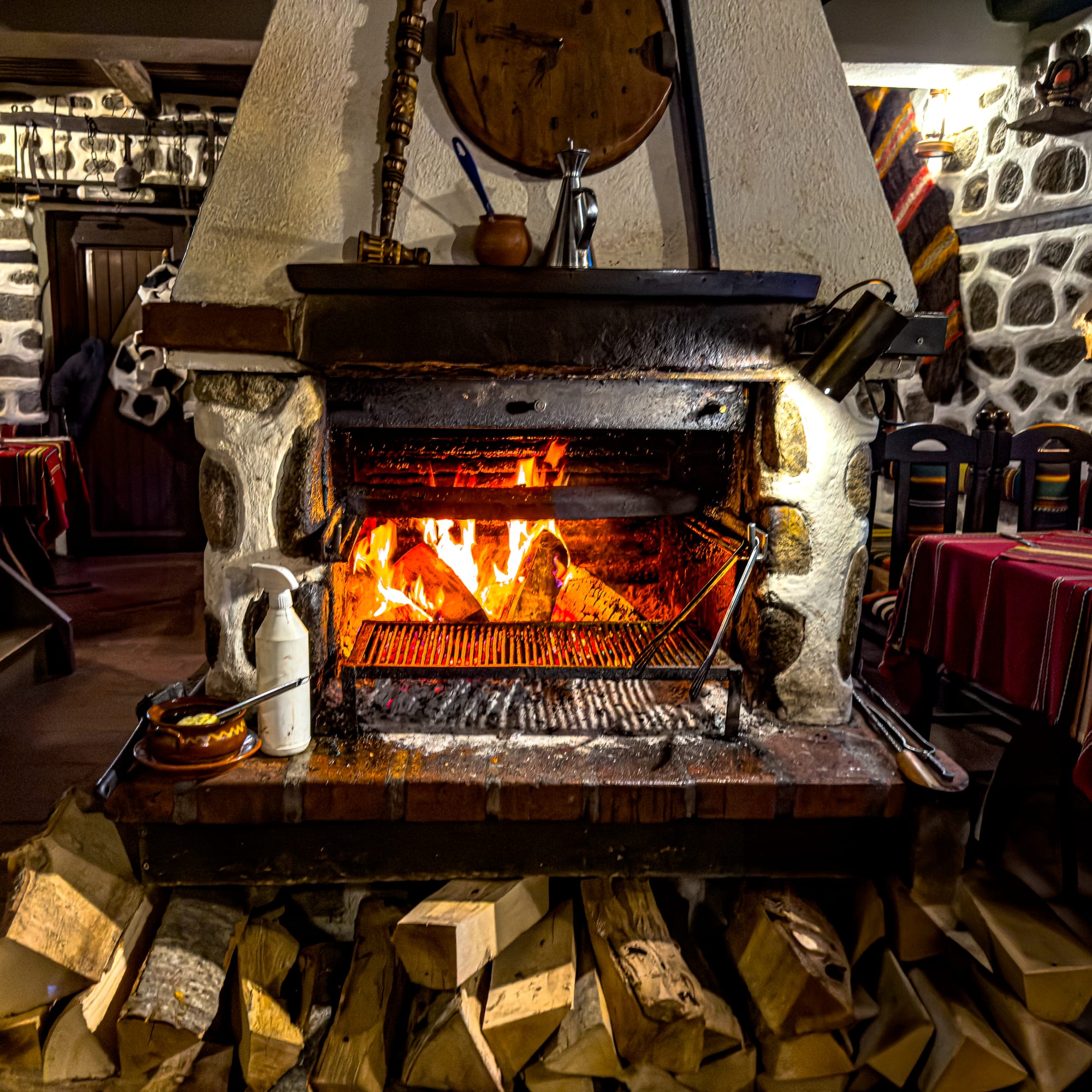
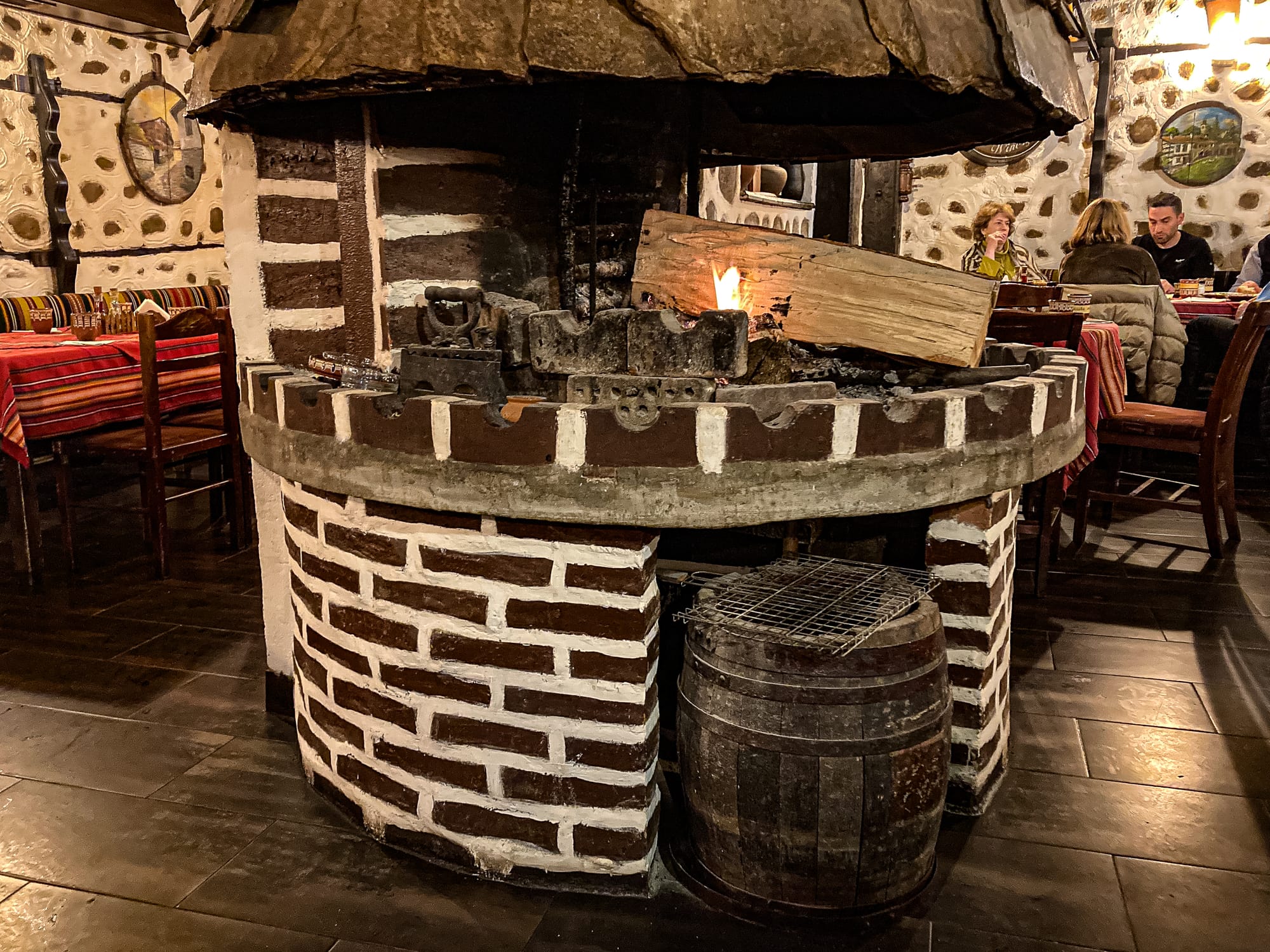
Mehanas across Bansko
Many places have the same aesthetic, so much so that it feels like every mehana is a variation of one template. The vibe is warm, hearty, and unpretentious, designed for long, lingering meals rather than quick bites. For vegans, the atmosphere is part of the experience even if the menu is limited—sitting at a wooden table under dim lighting with the smell of grilled food and wood smoke in the air feels like a quintessential Bulgarian moment.
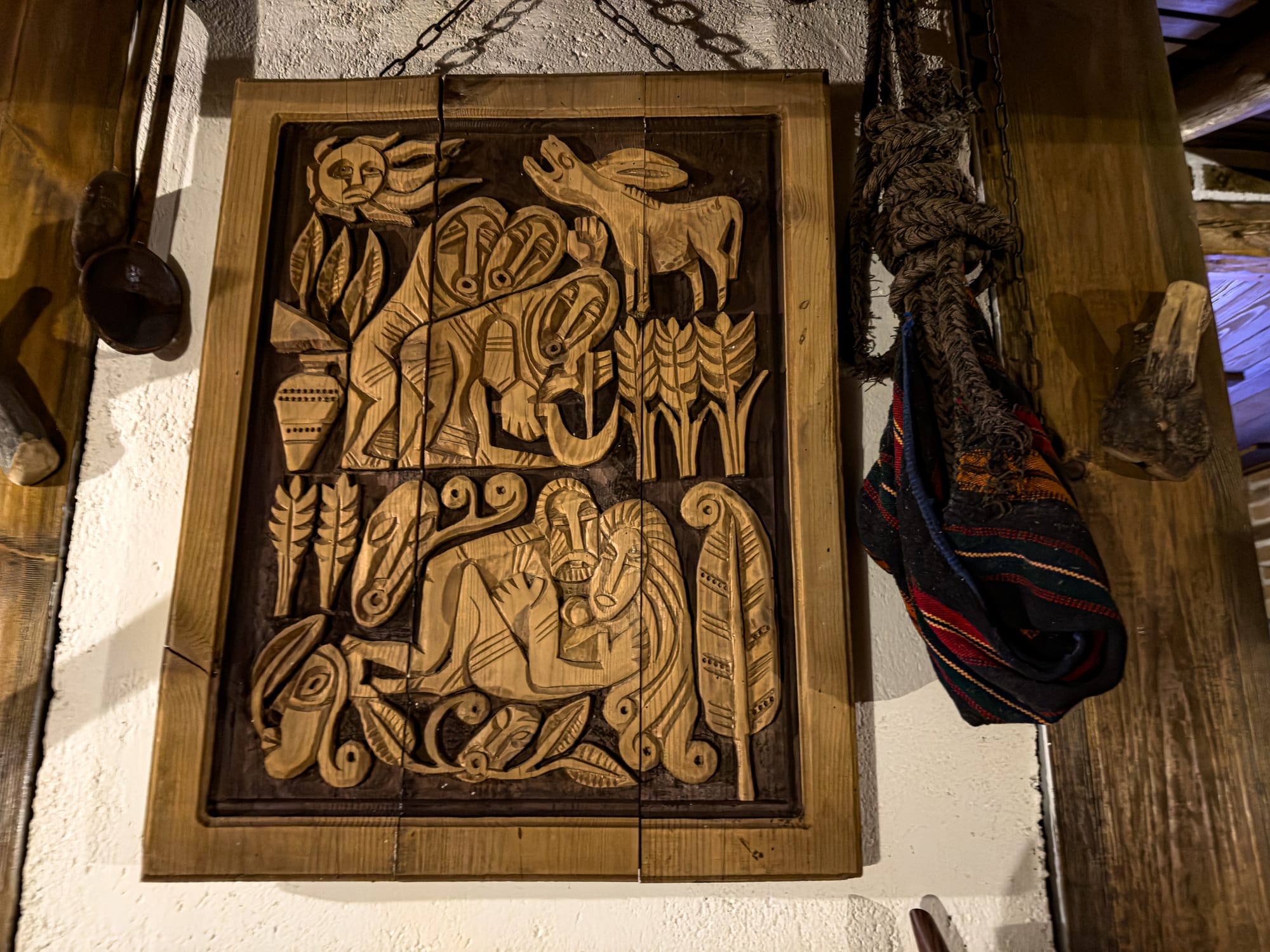
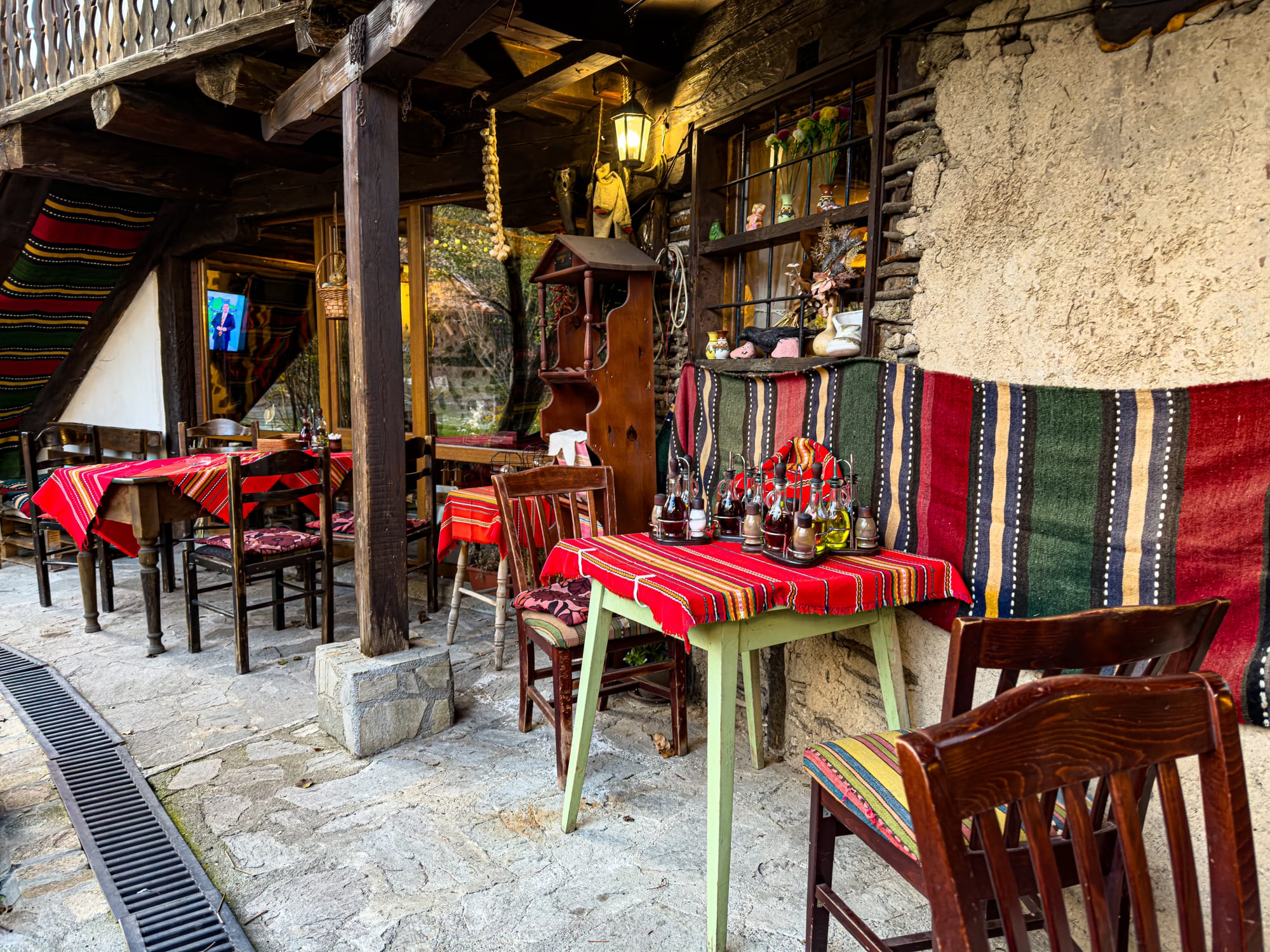
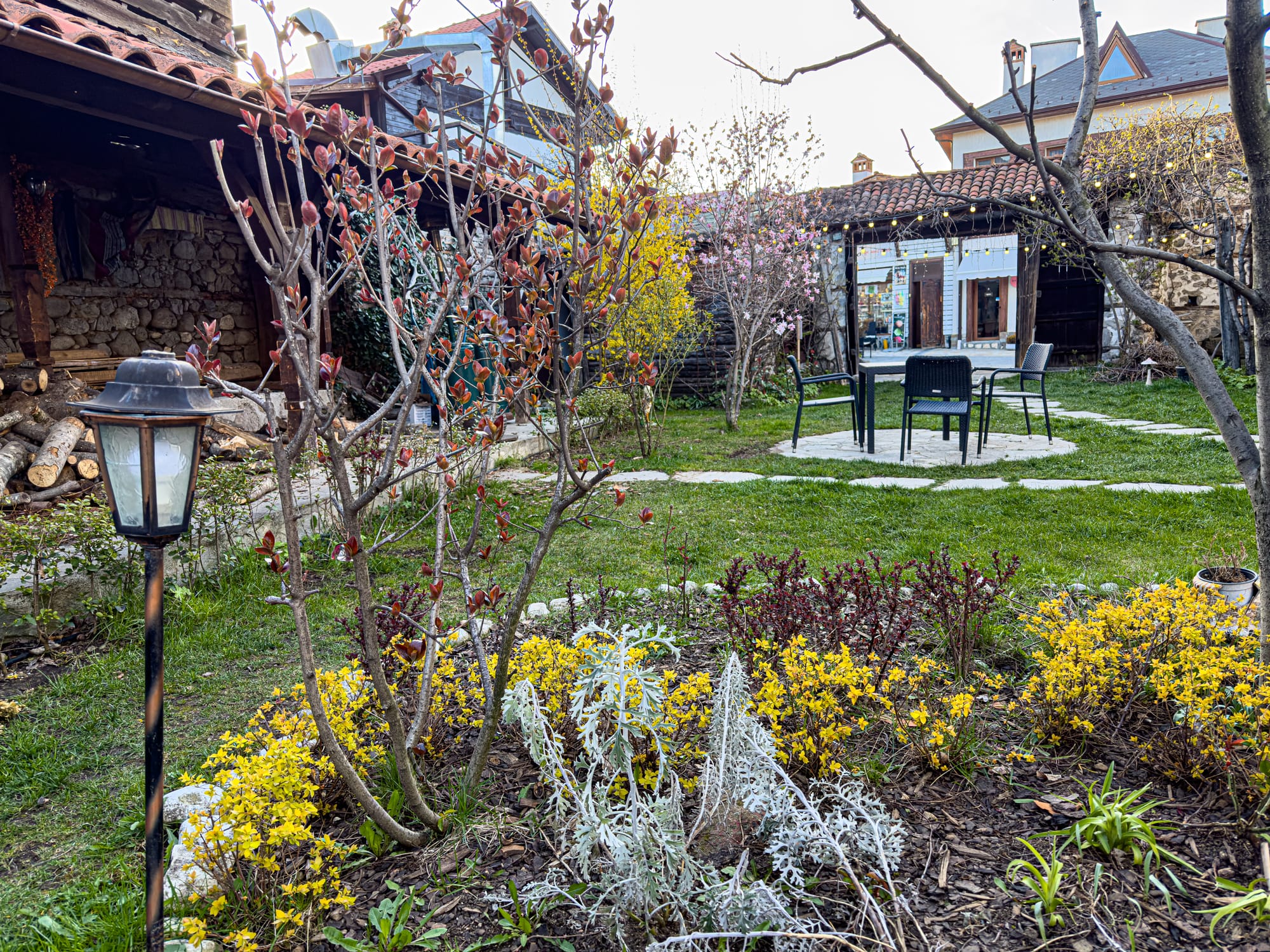
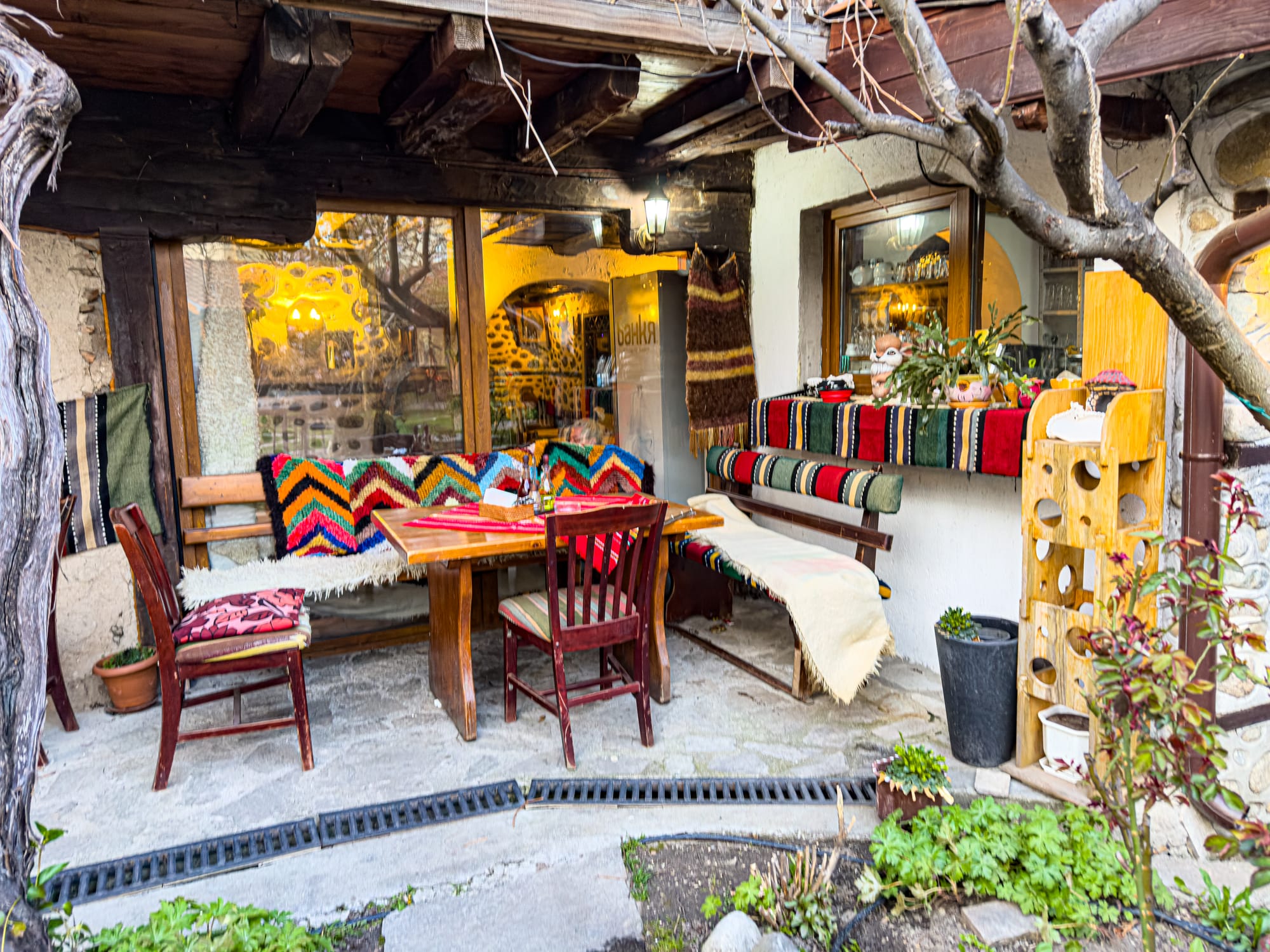
Mehanas across Bansko
For us, one mehana was as good as another—they all felt similar in menu, atmosphere, and experience, though other people may certainly tell you they have a favorite. Because of that, we’re not going to highlight particular restaurants here. Instead, the key is knowing what to look out for on the menu and what small tweaks to request. With just a little bit of communication, you can usually pull together a satisfying vegan meal from these classic staples.
Vegetable sach
One of the easiest vegan-friendly dishes to order is the vegetable sach. This is a sizzling clay or cast-iron platter piled high with zucchini, peppers, onions, and mushrooms. It’s usually served still bubbling, with the vegetables lightly charred from the heat. By default, it’s already plant-based, which makes it a great option when you’re scanning the menu for something hearty and reliable.
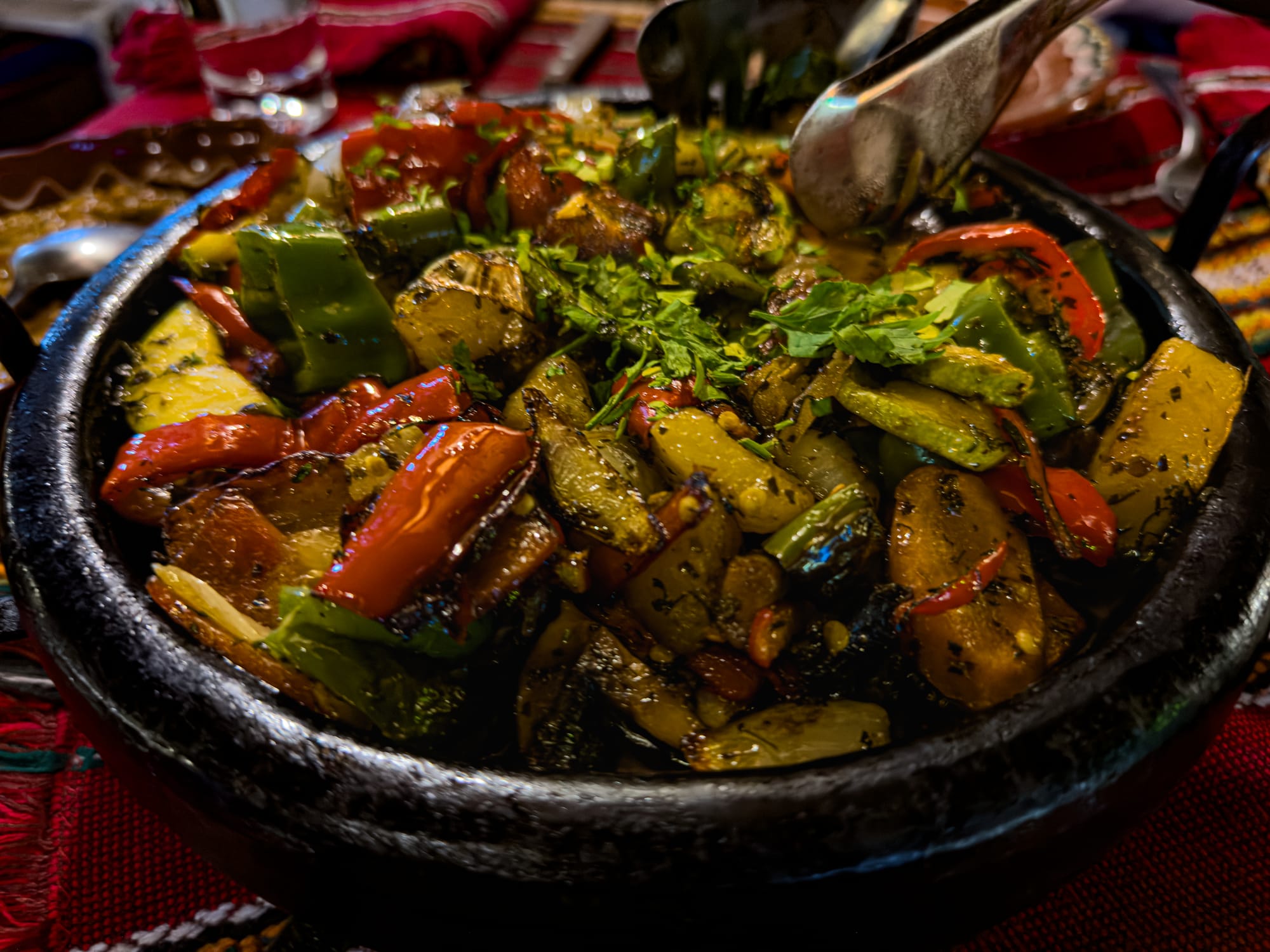
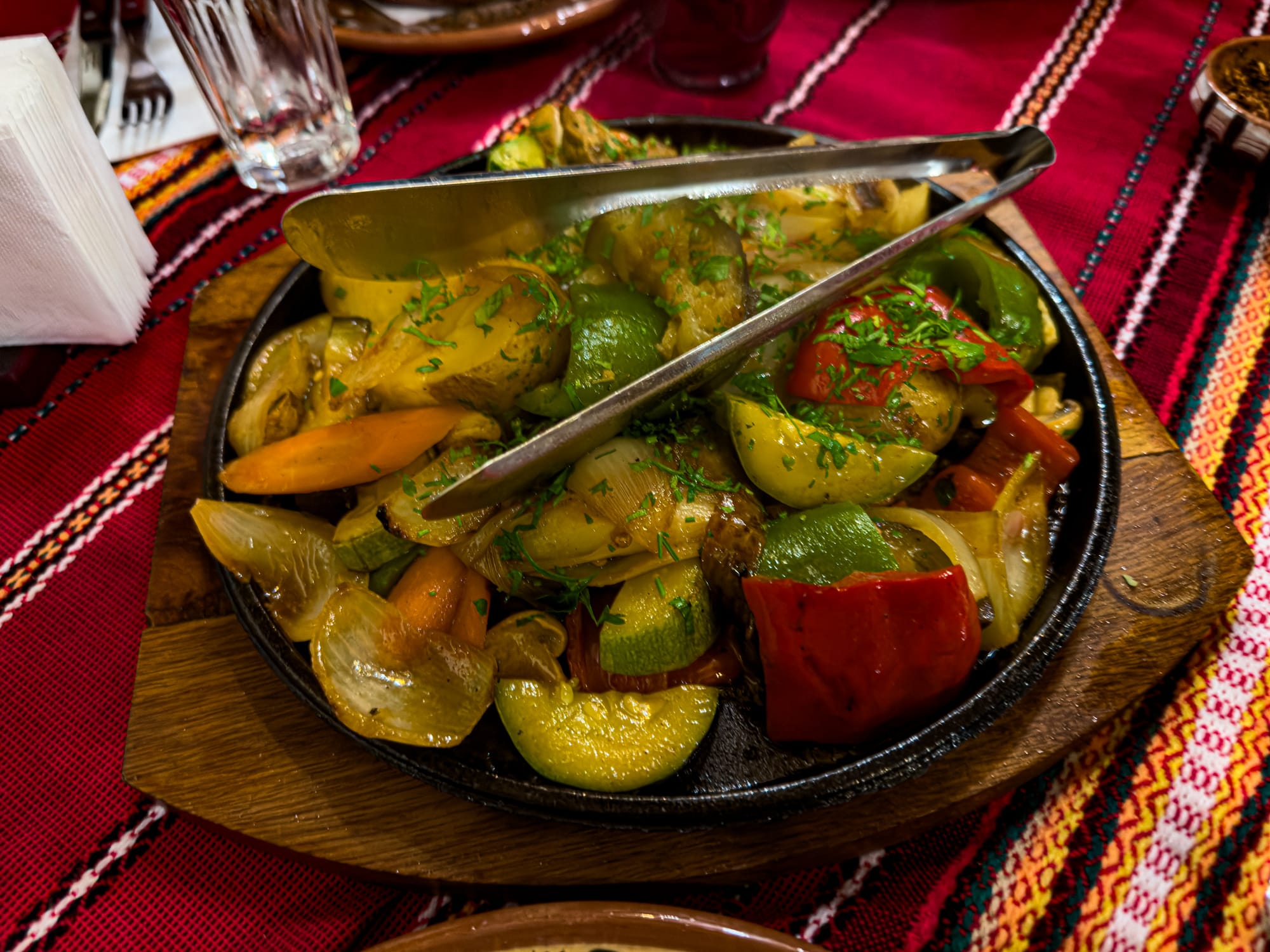
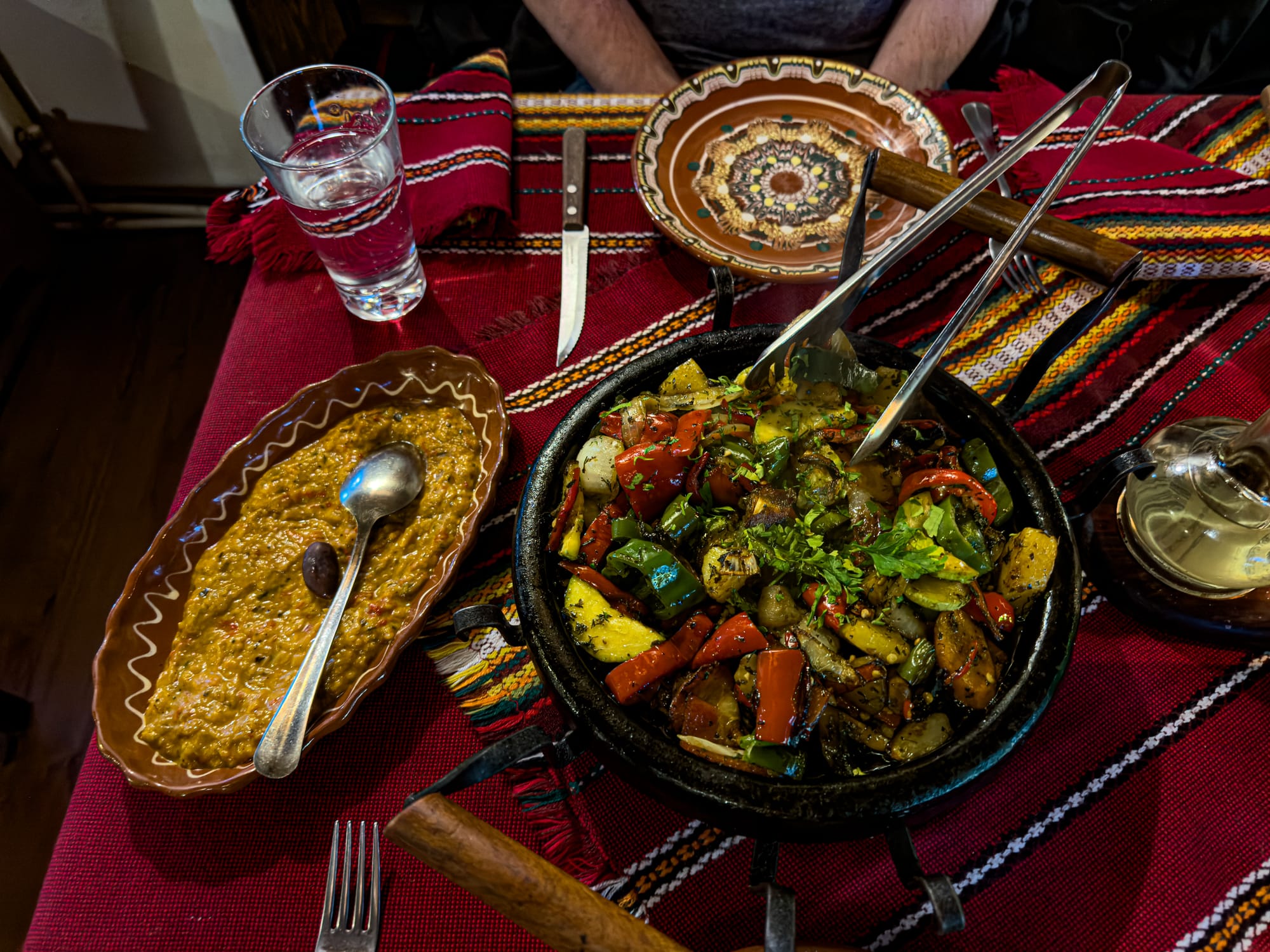
Vegetable sach
Because it’s a sharing dish in Bulgarian culture, the portion sizes are usually very generous. You can order a vegetable sach on its own and easily make a meal out of it, or pair it with some bread and a side of lutenitsa for extra flavor. It’s one of those rare “set-and-forget” items on the menu: as long as you see it listed, you can order it without needing to modify much.
Lutenitsa
Lutenitsa is a roasted red pepper and tomato spread that is everywhere in Bulgaria—and it just happens to be vegan. It’s rich, smoky, and slightly sweet, with a texture somewhere between a dip and a sauce. You’ll find it served as a side dish, in little ramekins alongside bread, or sometimes used as a condiment with grilled vegetables or potatoes.
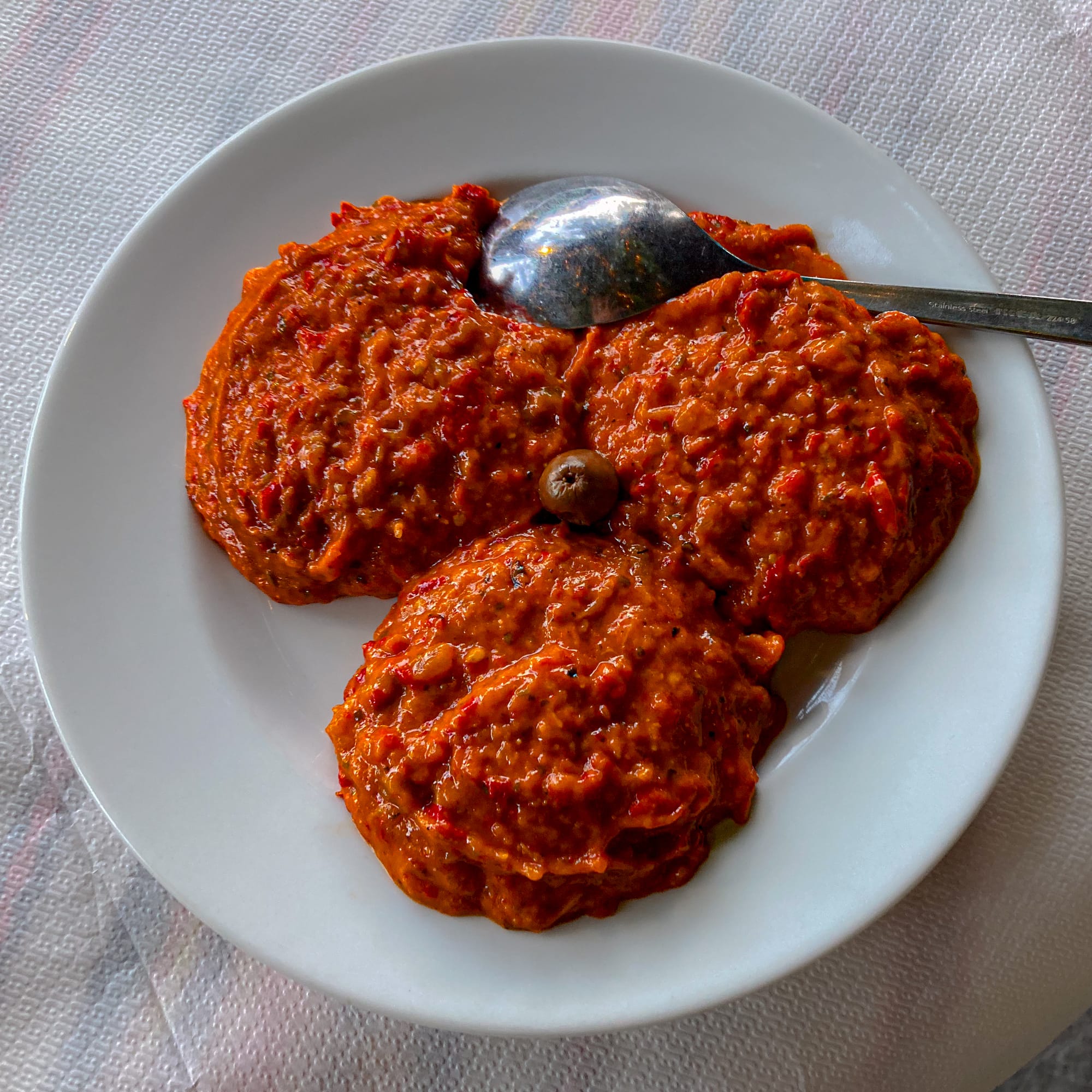
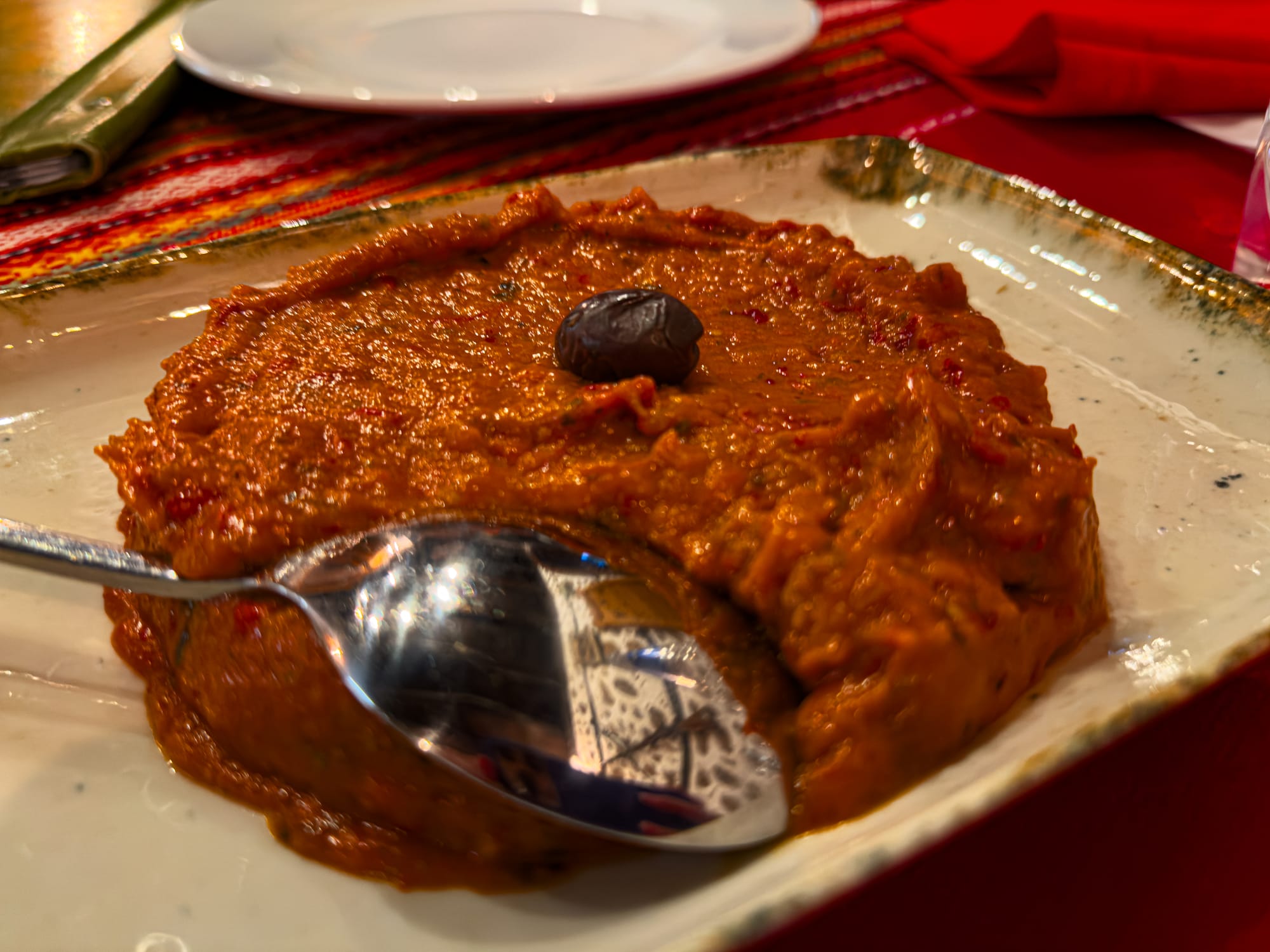
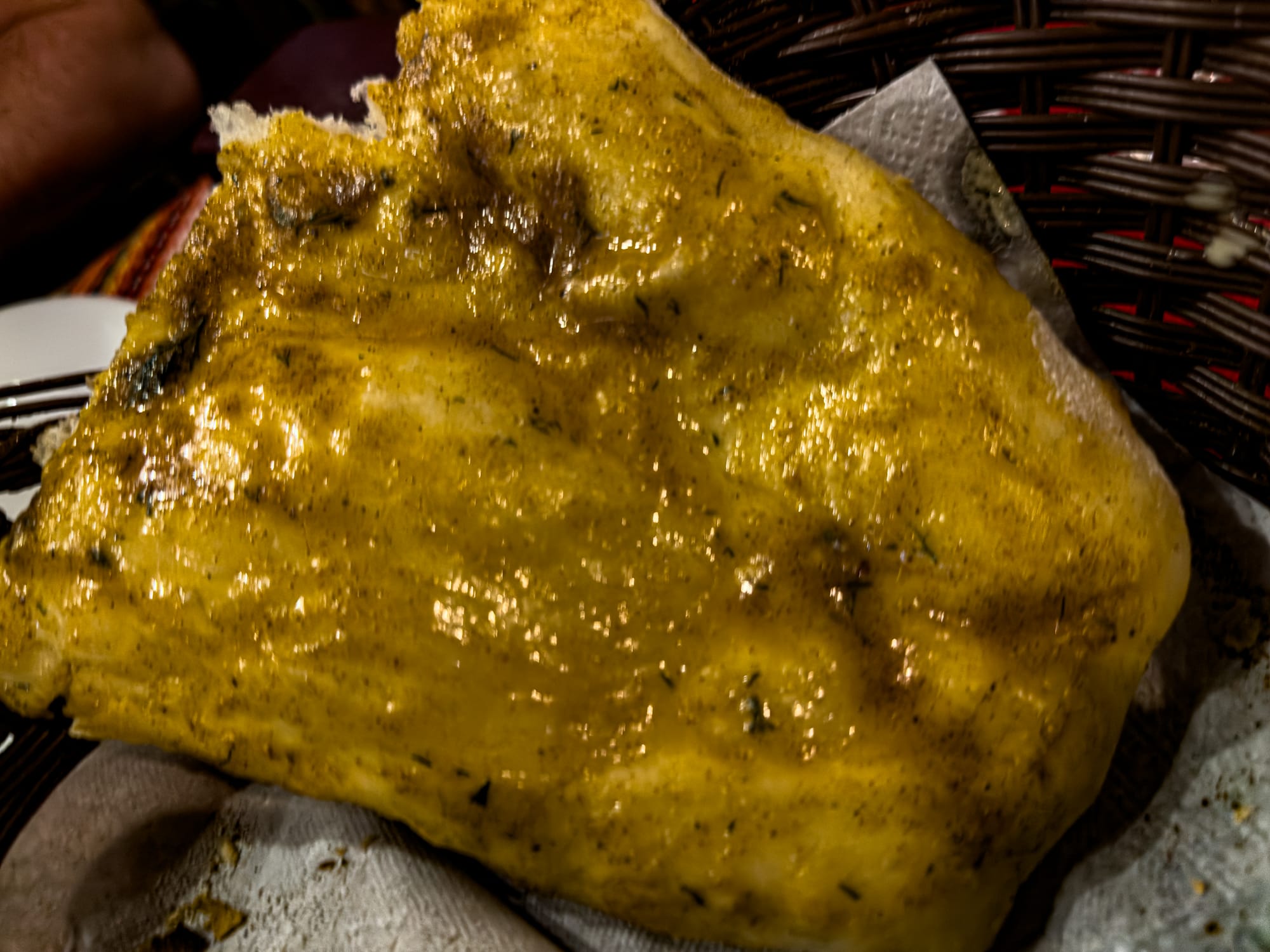
Lutenitsa and parlenka
For vegans, it’s a real lifesaver: lutenitsa instantly adds depth and flavor to even the simplest meal. Order it with bread (parlenka) for dipping, or spread it over roasted potatoes for a little extra richness. Because it’s so ubiquitous, you’ll quickly find yourself ordering it again and again—it’s one of the easiest plant-based wins in Bulgarian cuisine.
Bean soup
Bean soup, known as bob chorba, is one of the cornerstones of traditional Bulgarian cooking, and it’s almost always vegan by default. Made with white beans simmered slowly with onions, carrots, and herbs, it’s warming, nourishing, and very affordable. Every mehana seems to have their own slight variation, but the essence is always the same: simple ingredients brought together in a way that feels greater than the sum of their parts.
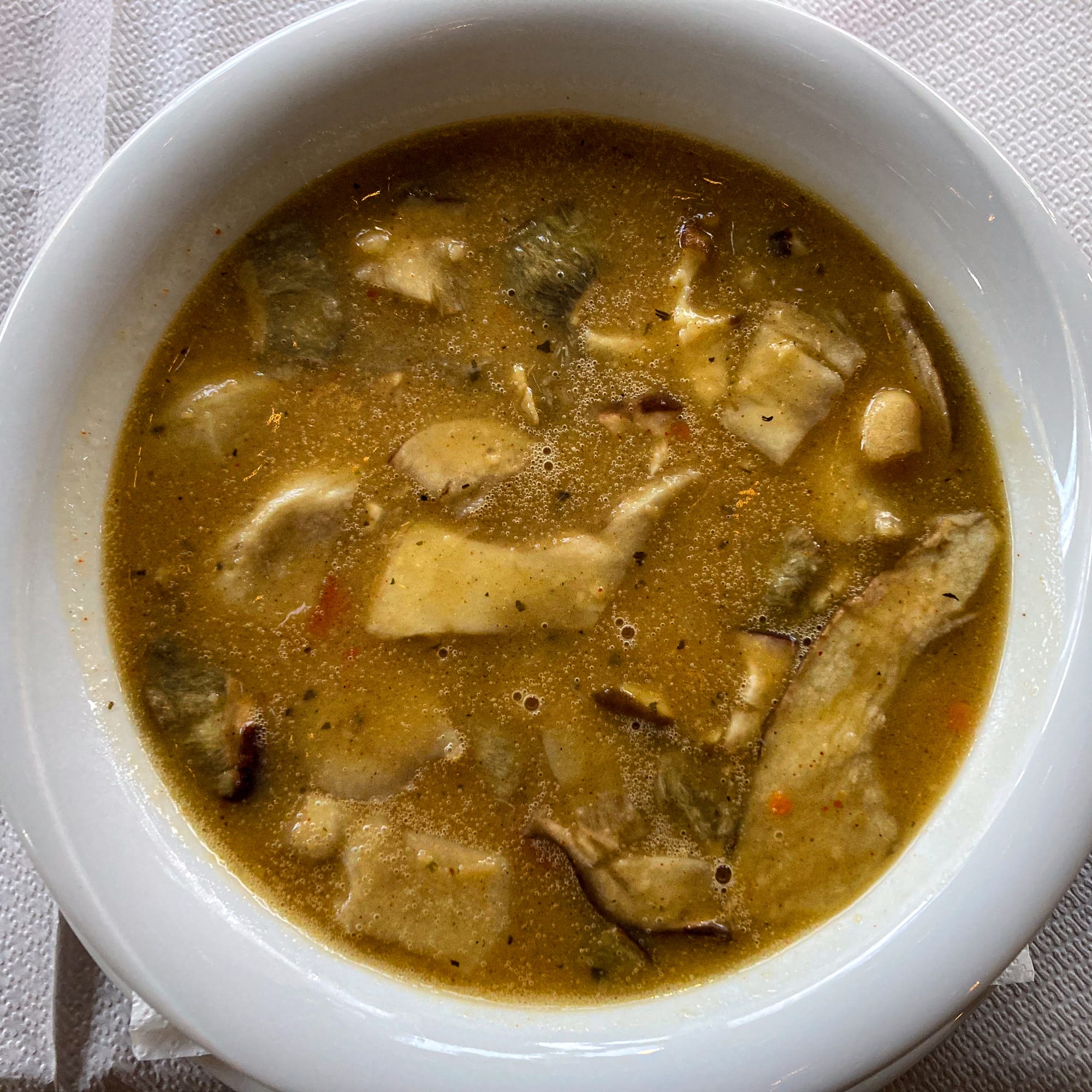
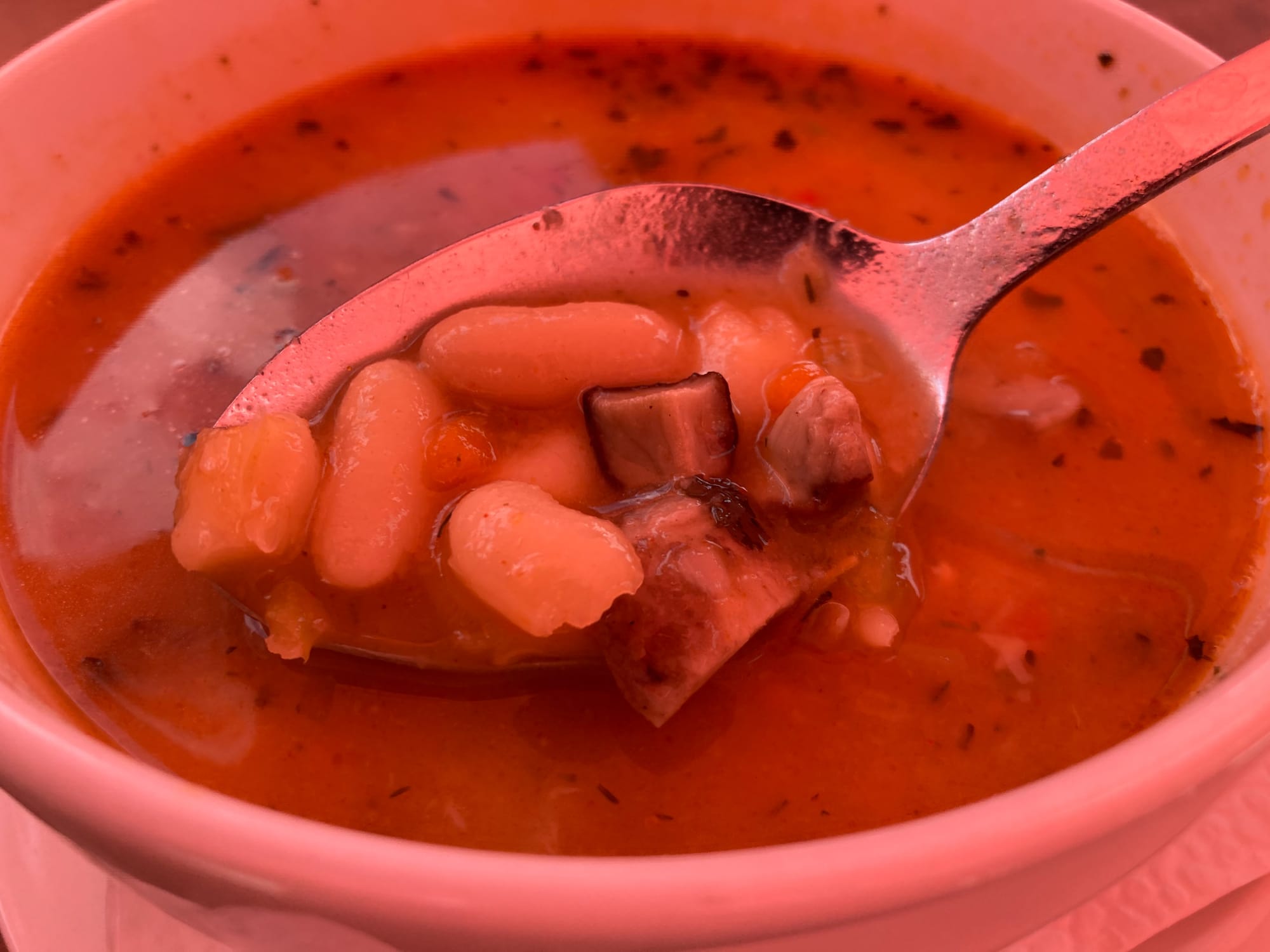
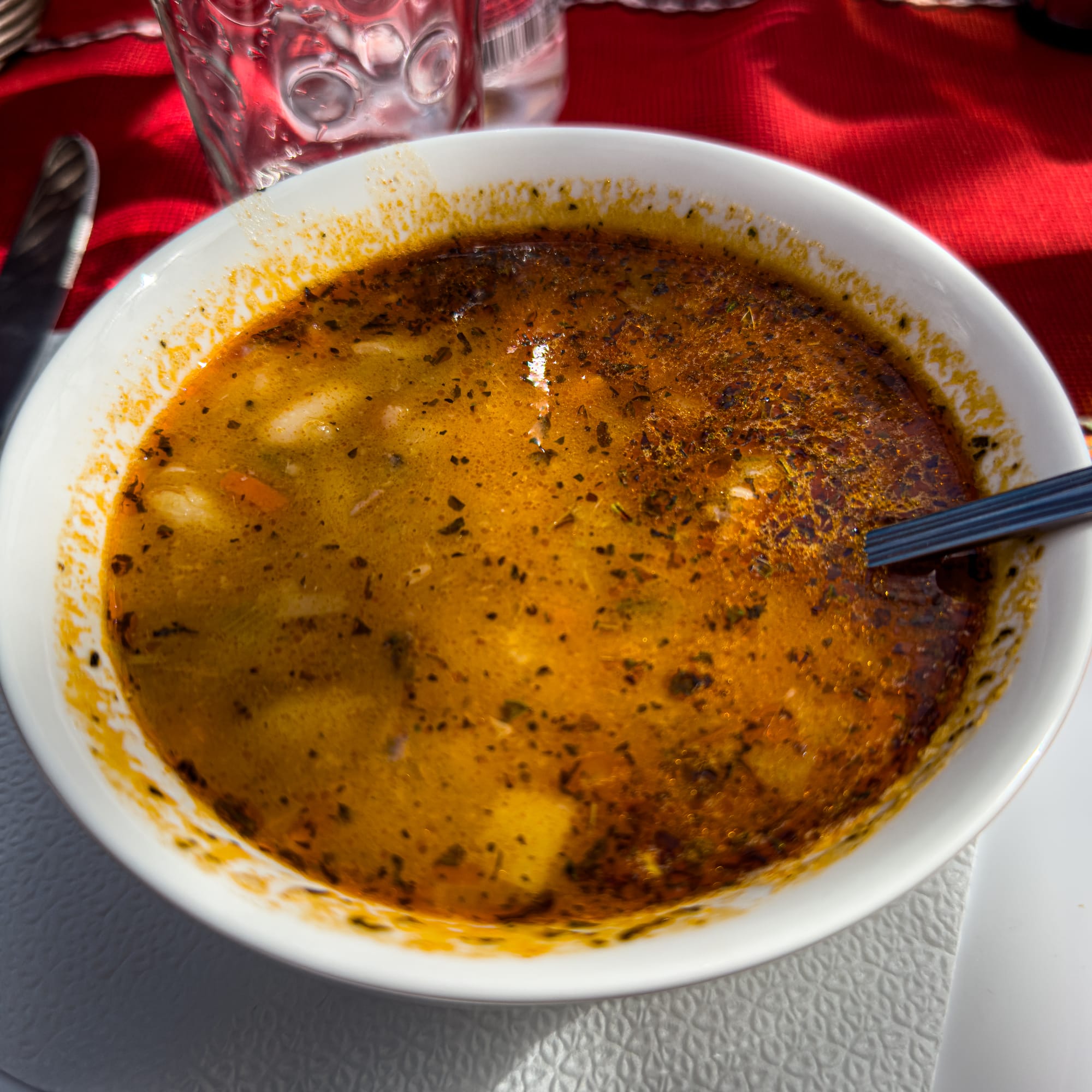
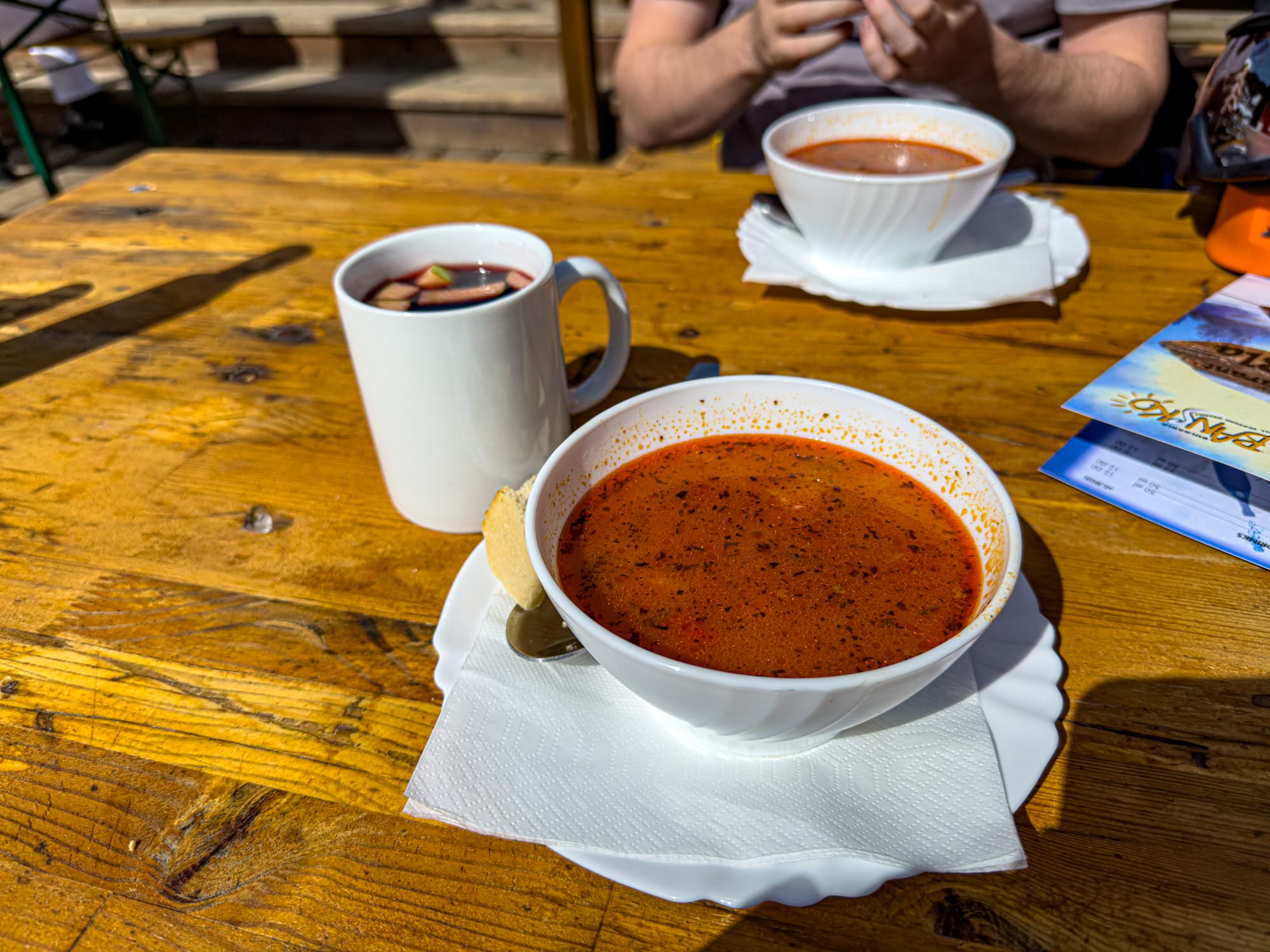
Bean soup
It’s often served as a starter, but the portions can be big enough to stand on their own, especially when paired with bread. It’s also one of the most consistent vegan-friendly dishes—you don’t usually need to request modifications. For those looking for something traditional that also happens to be plant-based, bob chorba is a must-try.
Potatoes in olive oil
Another common menu item you’ll find everywhere is potatoes cooked in olive oil. They might come roasted, pan-fried, or even served with garlic and herbs, depending on the kitchen. By default, they are usually vegan-friendly, but it’s always worth asking to confirm they’re prepared with oil rather than butter. Some places will automatically use olive oil, but in others, butter is the norm.
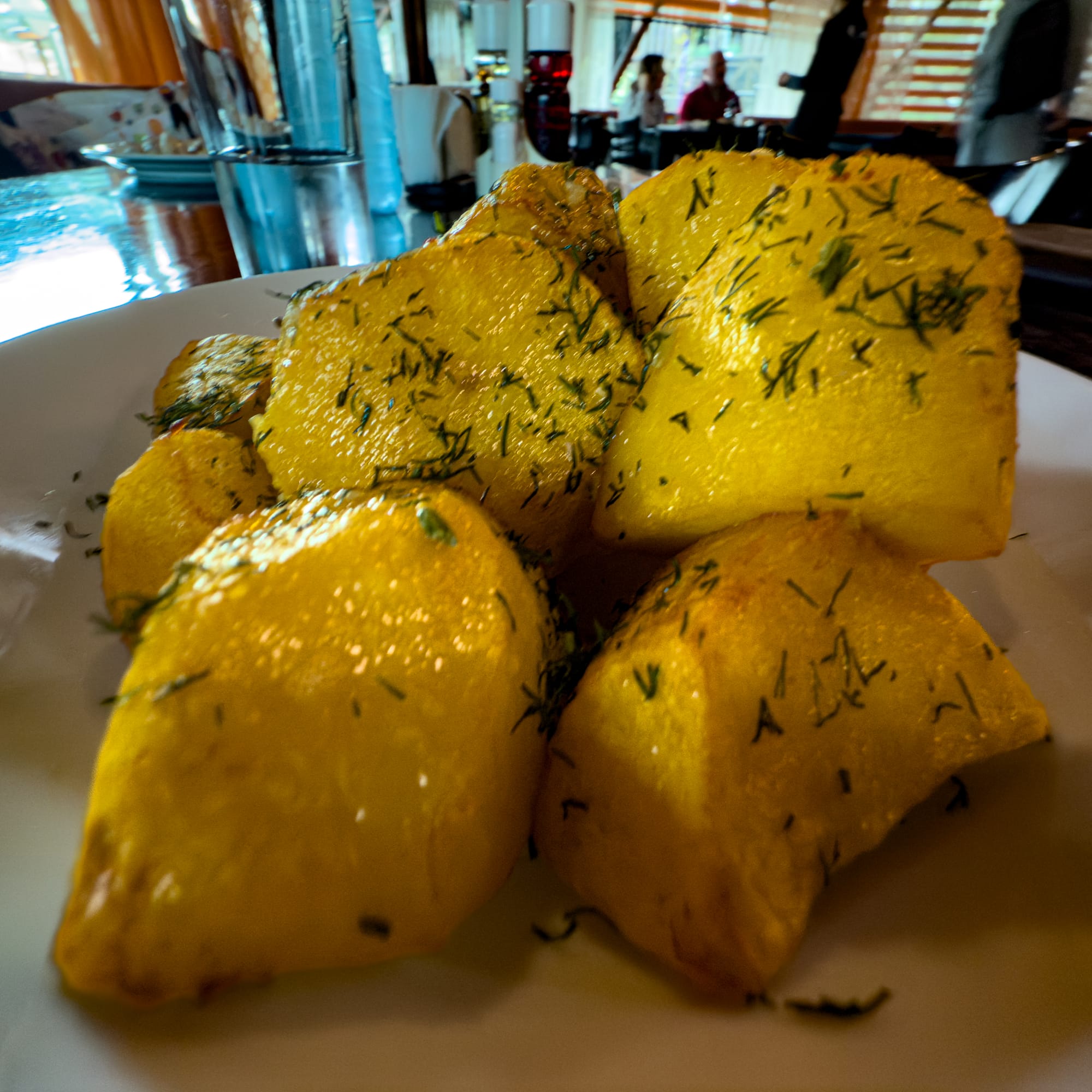
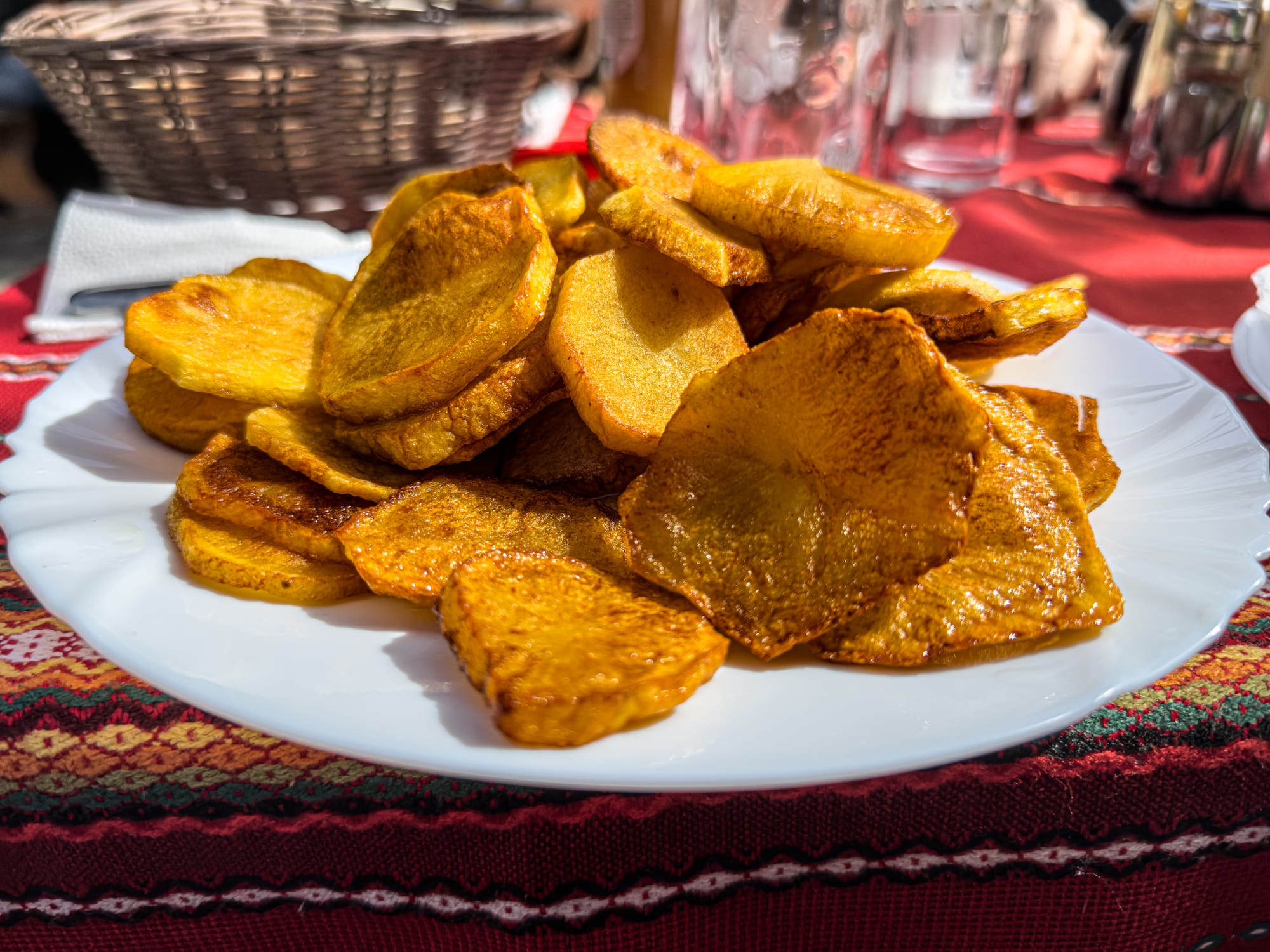
Potatoes in olive oil
Potatoes are often listed as a side dish, but the portions in Bansko can be very generous—more like a full plate than an accompaniment. Pair them with lutenitsa or a vegetable sach and you’ve got yourself a filling, balanced meal. It’s simple food, but in the mountains of Bulgaria, simplicity often tastes the best.
Wild mushrooms in olive oil
Wild mushrooms are another staple of Bulgarian mountain cuisine. Most often, these are porcini mushrooms, prized for their earthy, meaty flavor. When cooked properly in olive oil, they are tender and rich, a perfect centerpiece for a vegan plate. However, you’ll need to be careful here: mushrooms sautéed in butter are also a very common preparation, and the menu won’t always make that distinction clear.
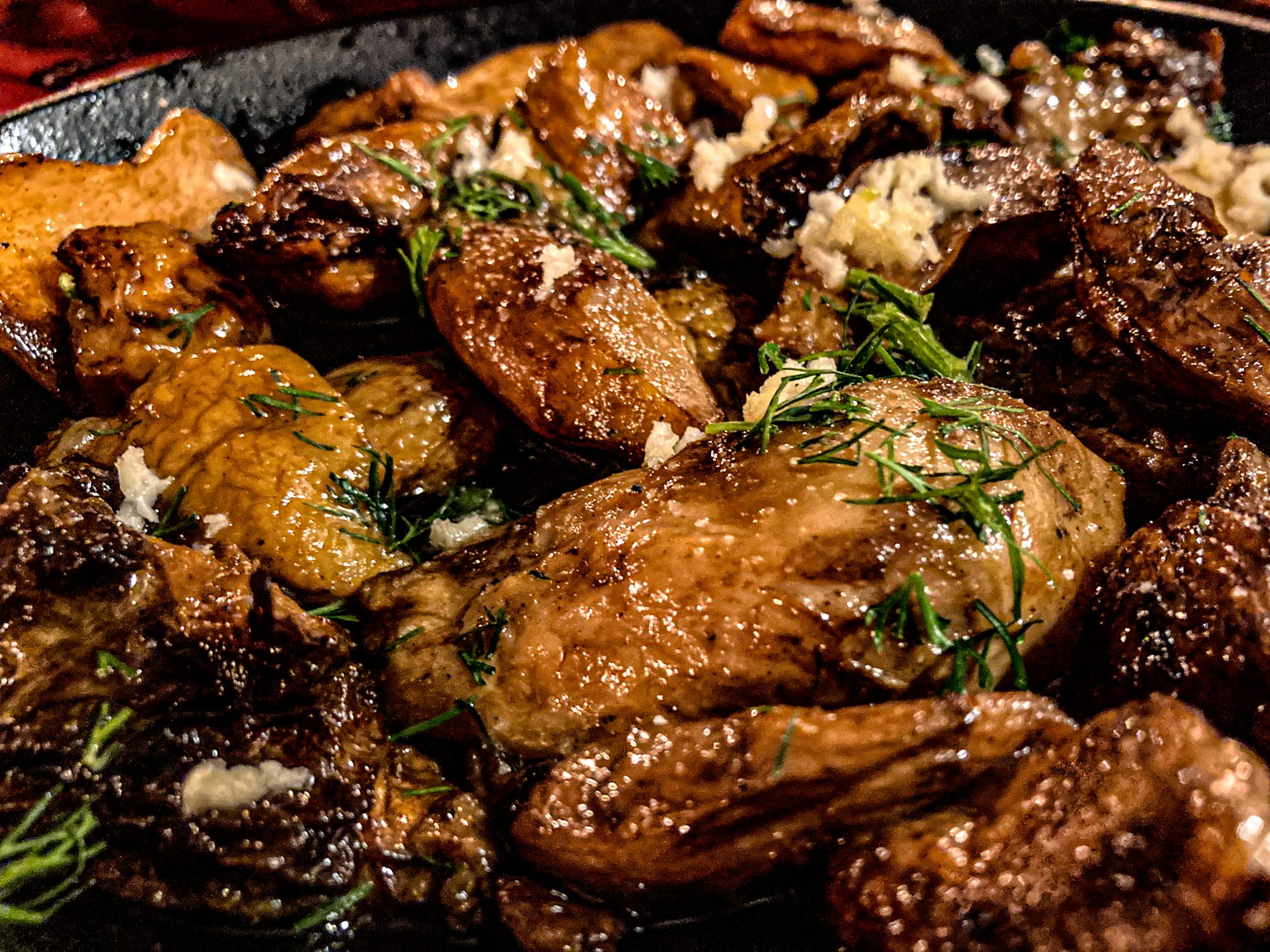
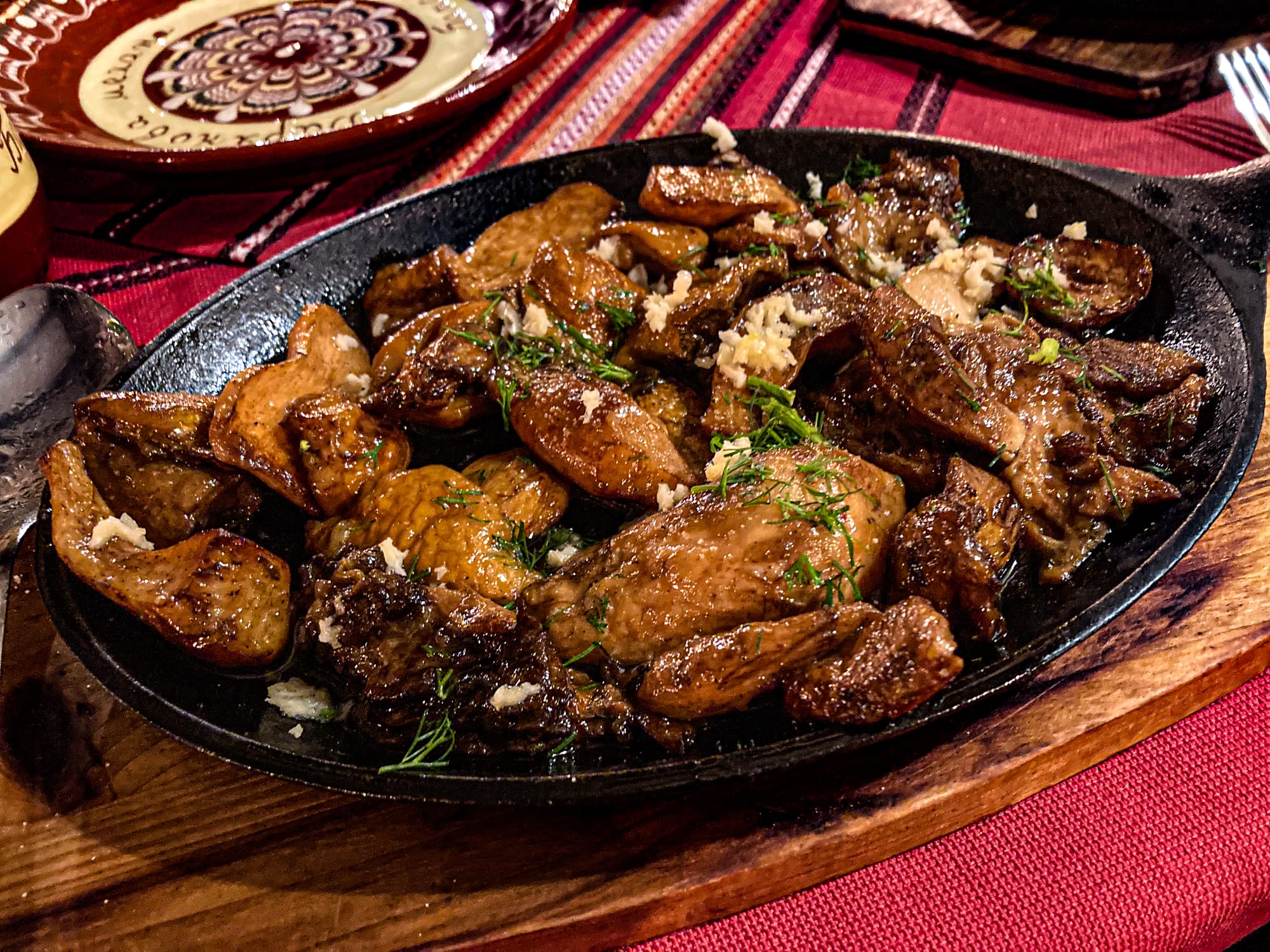
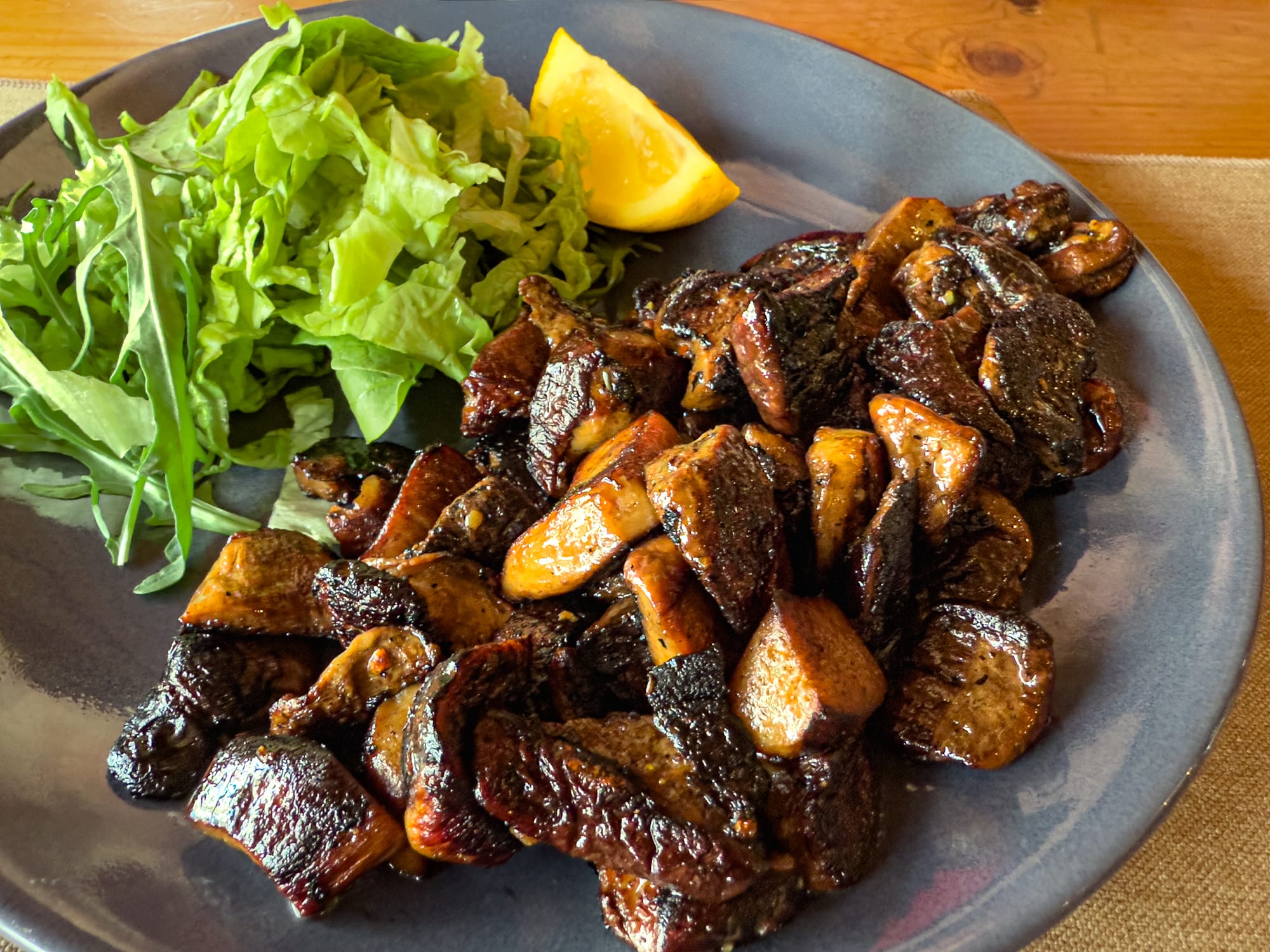
Porcini mushrooms in olive oil
To stay on the safe side, double—or even triple—check with your server that the mushrooms are cooked in olive oil instead of butter. Most staff are used to this request and will happily accommodate it. When prepared with olive oil, they’re a beautiful, indulgent dish that feels distinctly local while still aligning with a vegan diet. For us, ordering mushrooms was always a highlight, especially when paired with bread and lutenitsa for a complete meal.
Where to shop for vegan products in Bansko
While eating out in Bansko as a vegan can be a challenge, stocking up on ingredients for cooking at home is much easier. Many nomads here lean toward preparing their own meals anyway, whether in a coliving with a shared kitchen or in a small apartment kitchenette. Thankfully there are a few places that make finding vegan products much less stressful.
Grosh
Grosh quickly became one of our favorite spots in town. It’s a local supermarket about a five-minute walk from Avalon Coliving, and it consistently carries a range of vegan essentials that can be hard to find elsewhere. You’ll usually see vegan cheeses in the refrigerated section, along with a surprisingly large variety of plant-based milks—everything from oat and hazelnut to pistachio, which we hadn’t tried before coming here. Grosh also stocks vegan dips and a solid selection of imported goods, which makes it a great place for those specialty items you might miss from home.
What makes Grosh even better is the small café attached to the store. Here, you can order a vegan burger topped with vegan cheese, a pizza made with the same products they stock in-store, or a vegan sandwich. It’s casual, affordable, and convenient—especially when you just want something easy without cooking. Between the supermarket and café, Grosh became a regular stop for us, both for shopping and for grabbing a quick bite.
The Sunday market
If you’re in Bansko on a Sunday, the local market is the best place to pick up fresh produce. The prices are much lower than the supermarkets, and the quality is fantastic. From tomatoes and peppers to seasonal greens, it’s the ideal place to stock your fridge for the week. Vendors also sell spices, legumes, and sometimes homemade preserves or pickles, which can add some extra depth to your cooking.
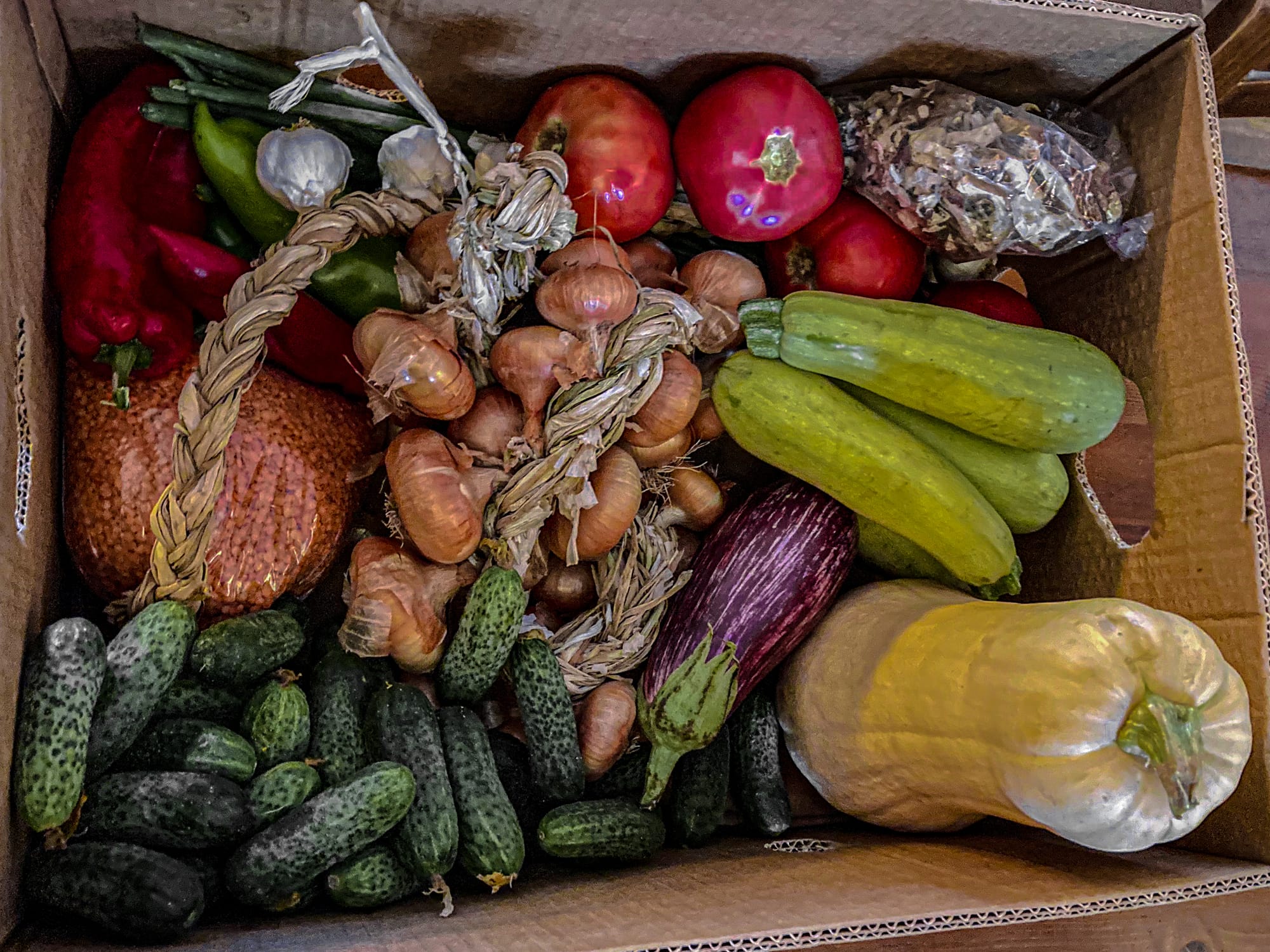
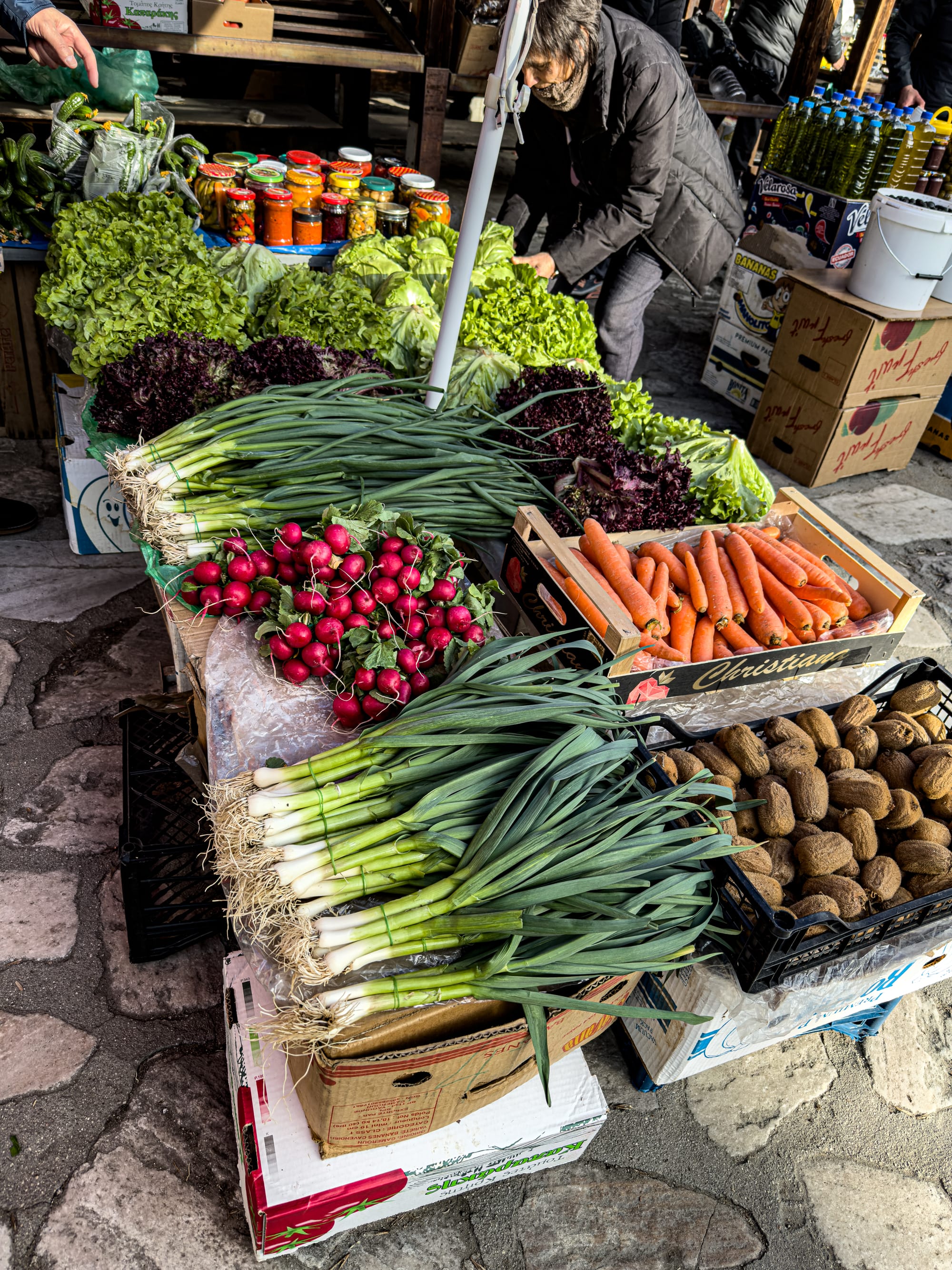
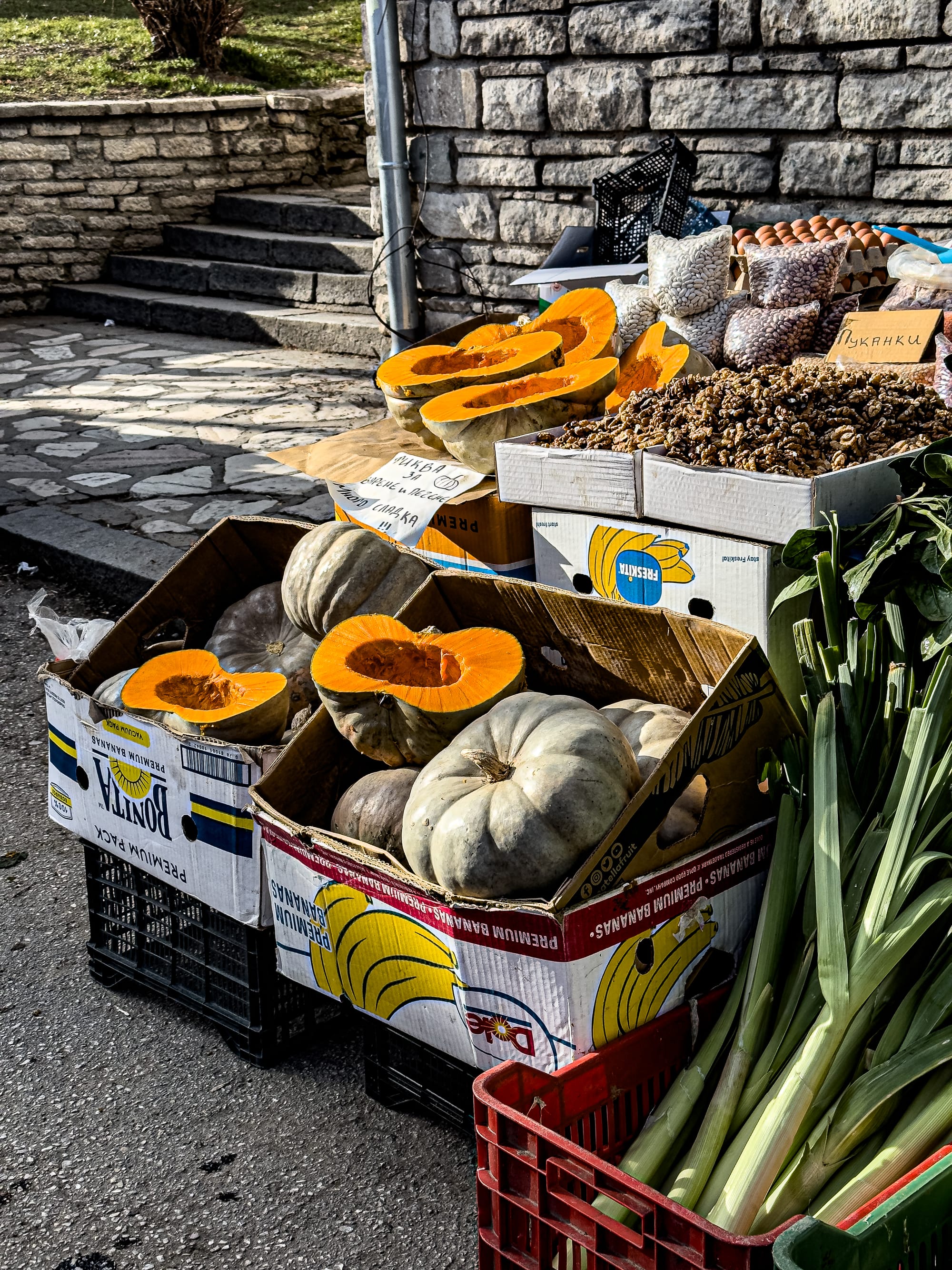
Fresh produce and seasonal goods at Bansko’s Sunday market
We found that buying produce here was both cheaper and more enjoyable than shopping at larger stores. It’s worth arriving earlier in the day for the best selection, and bringing cash makes transactions smoother. While the variety of vegan specialty products is minimal, the Sunday market is unbeatable for fruits, vegetables, and pantry basics.
eBag
For a wider selection of vegan specialty products, eBag is the way to go. It’s an online grocery store that delivers to Bansko, and the range of vegan products available is impressive. From vegan cheeses and pesto to multiple types of vegan burgers, crackers, and pantry staples, eBag has almost everything you might crave. We often found items here that we couldn’t source locally, and delivery was always reliable.
Cooking at home is a big part of the lifestyle in Bansko—especially for nomads staying long-term—so having access to eBag makes life a lot easier. We’d often place an order stocked with vegan cheeses, dips, and burger patties to keep in the fridge, then fill in the fresh produce gaps with a trip to the Sunday market. Together, these options created a balance between convenience and affordability, making plant-based living in Bansko feel much more manageable.
Foraged fruit in Bansko
One of the most unexpected joys of being in Bansko during the summer is just how much fruit you can forage without even trying. The town and its surrounding hills are dotted with fruit trees, and it often feels like you could live on what you gather as you walk around. For vegans, it’s a reminder that even in a place where restaurant menus aren’t brimming with plant-based options, nature provides in abundance.
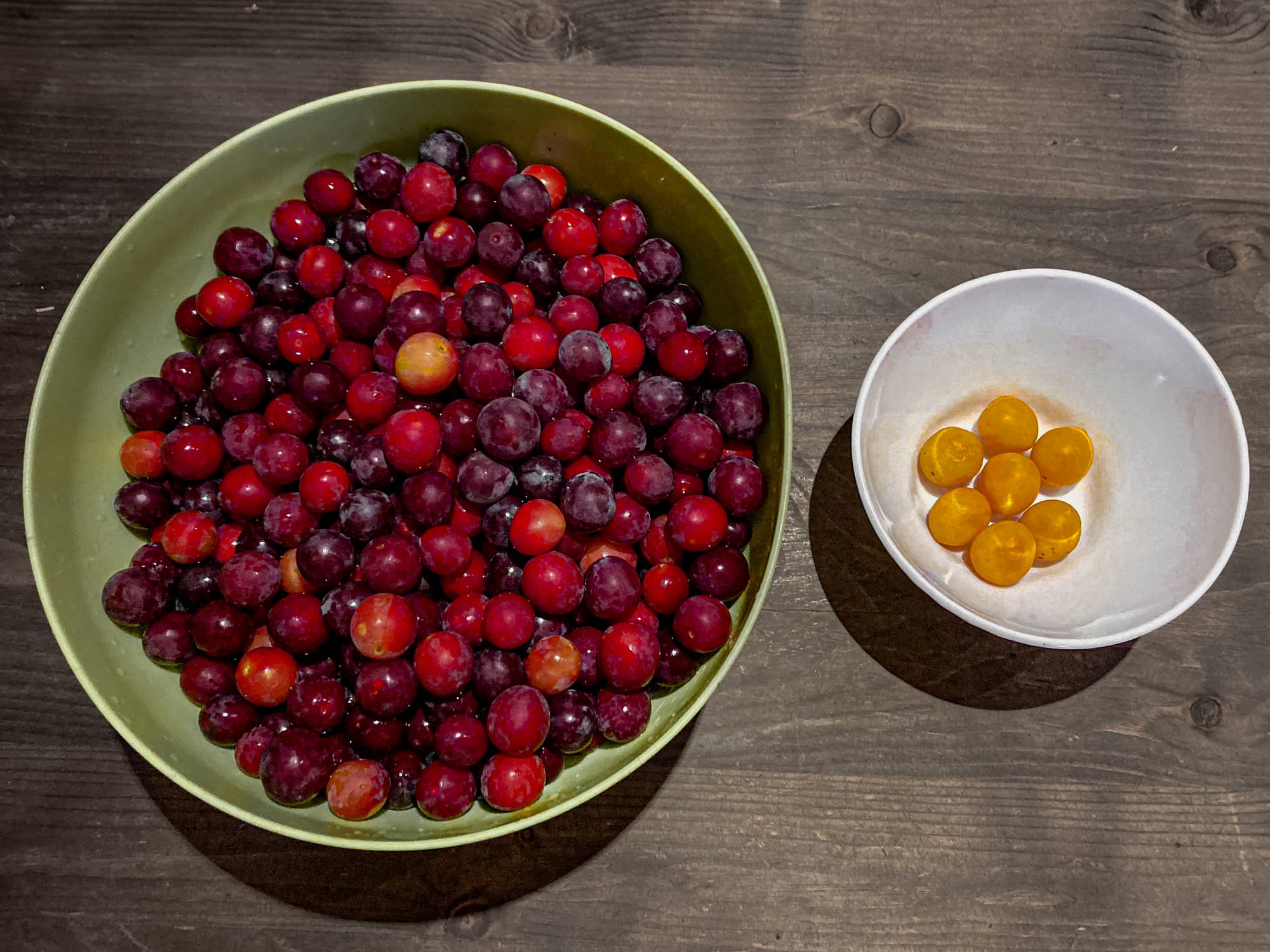
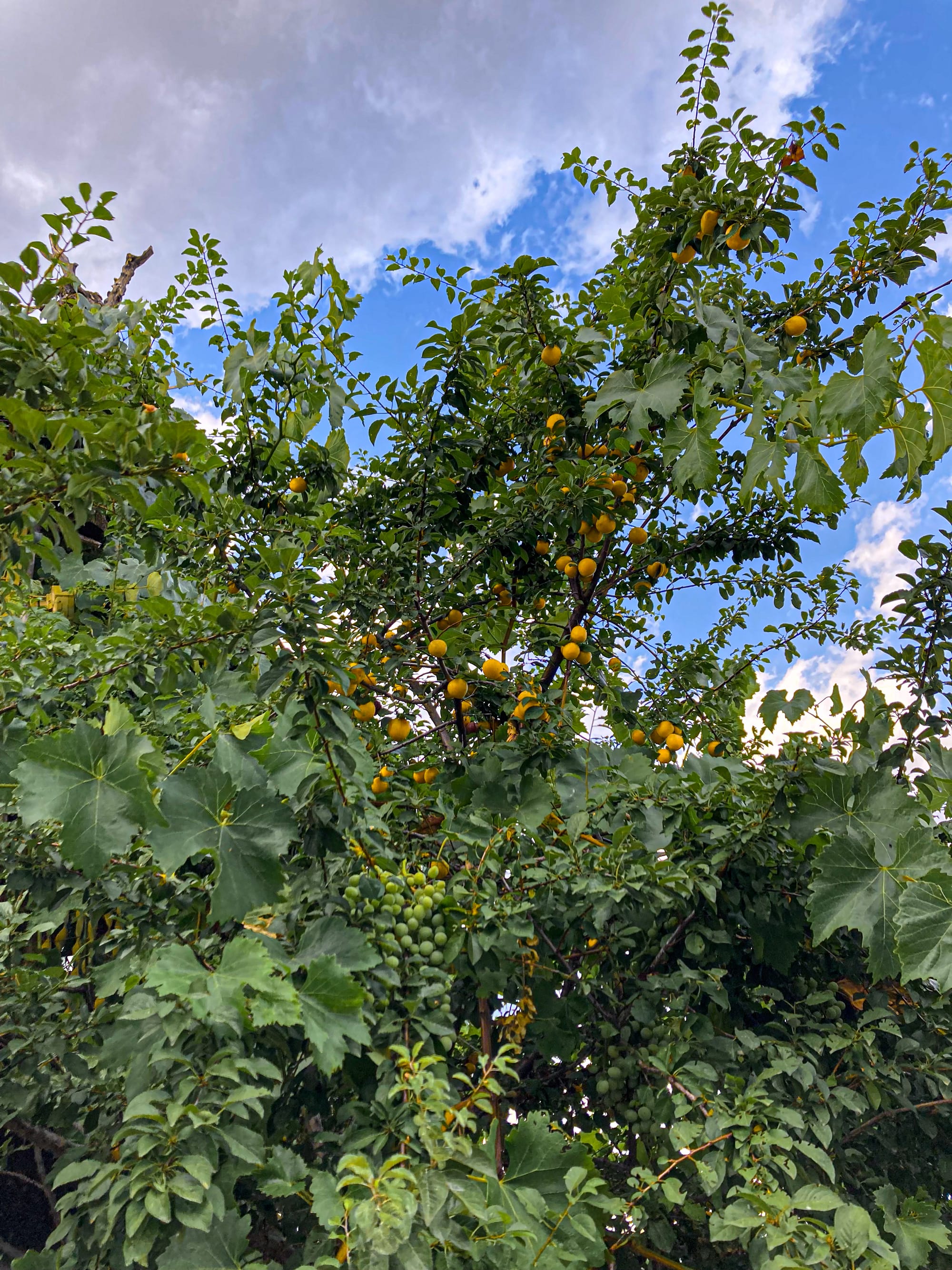
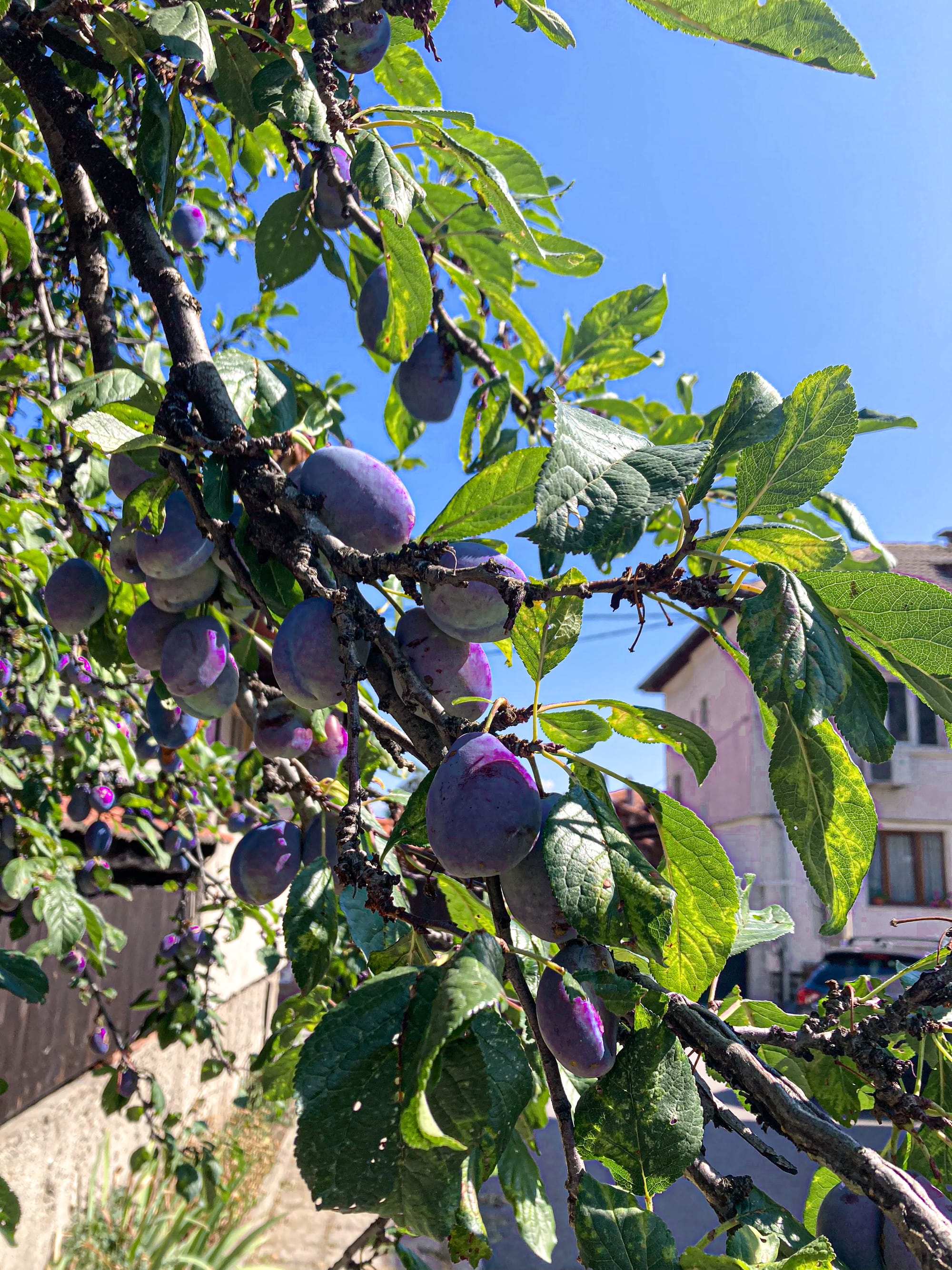
The Garden of Eden that is Bansko
Plum and apricot trees line backstreets and quiet corners, their branches heavy with ripe fruit by mid-season. Grapevines curl along fences and walls, offering clusters of sweet grapes in late summer. Peach trees brighten gardens and alleyways, sometimes so laden with fruit that they drop onto the ground. If you head into the mountains, you can even stumble across patches of wild raspberries, small and tart, growing along the trails.
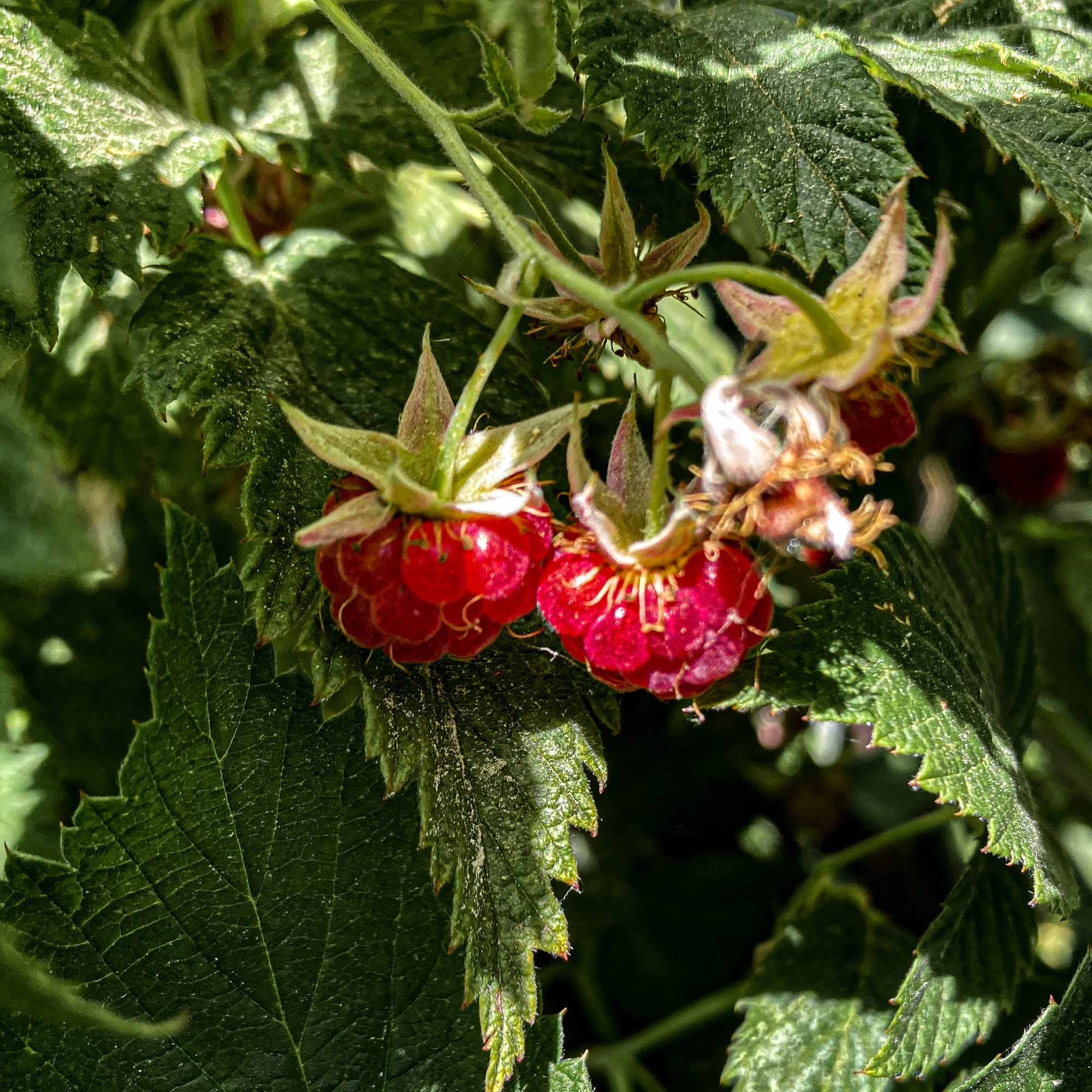
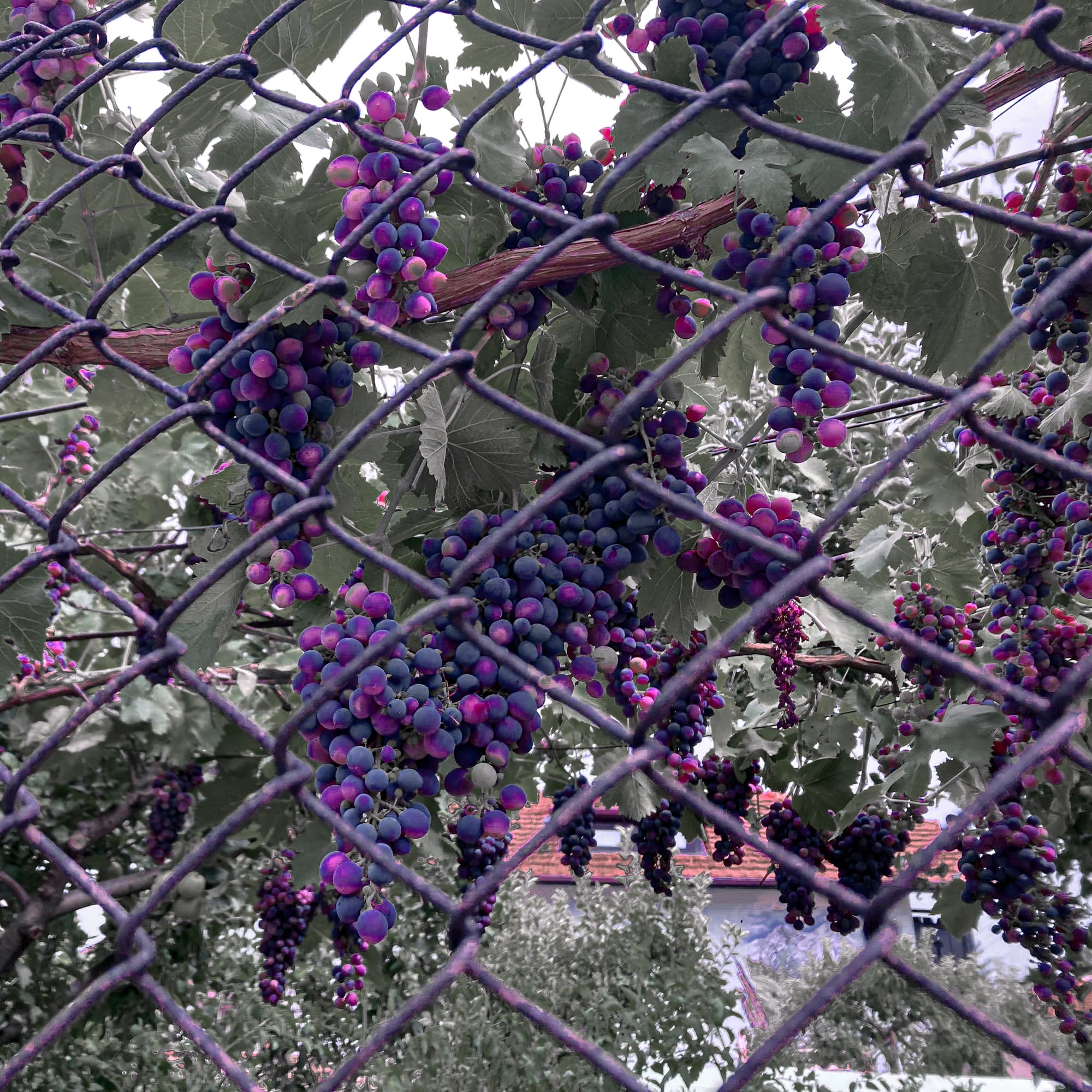
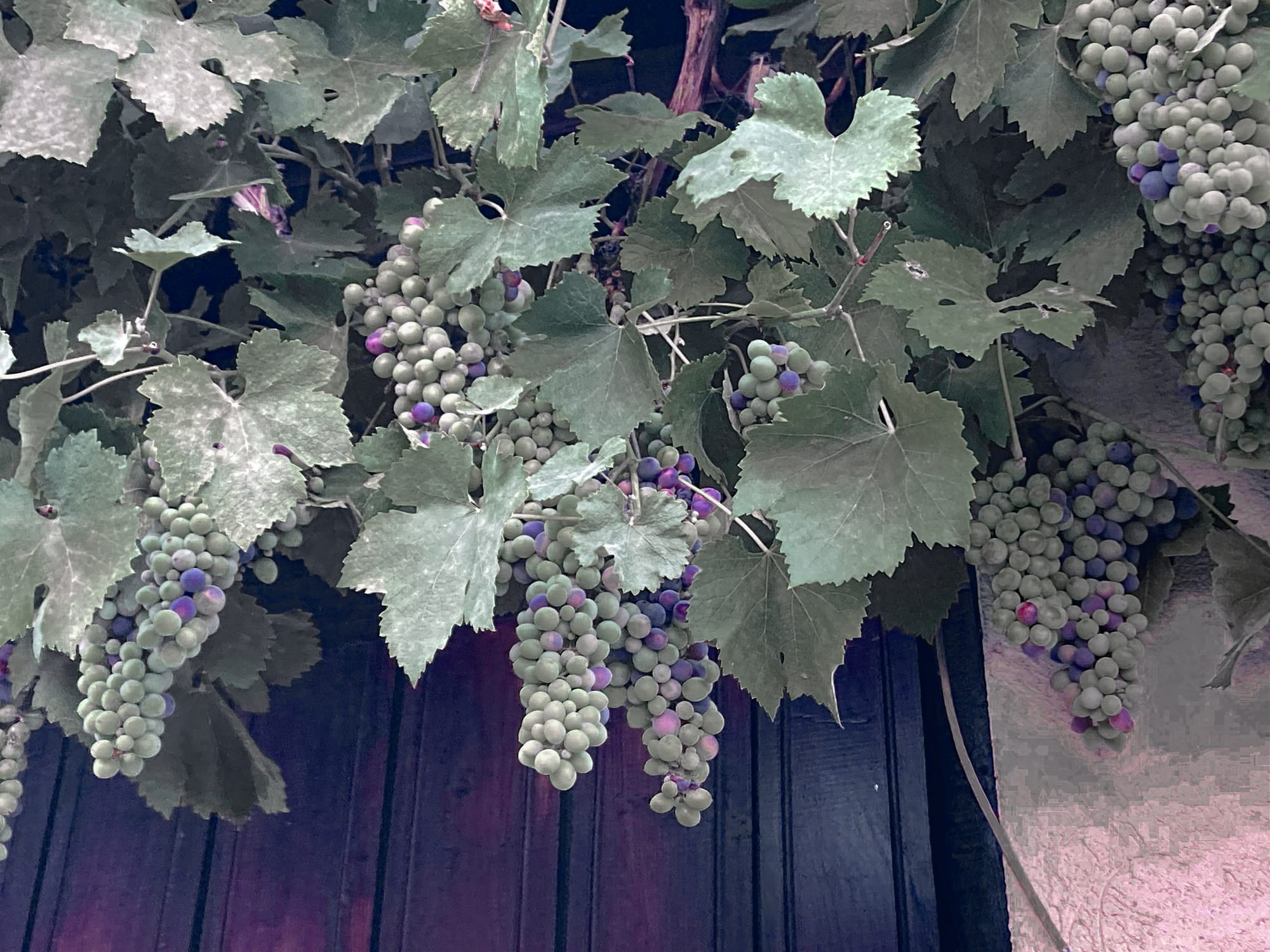
Grapevines heavy with ripening fruit, spilling over fences and rooftops throughout Bansko in late summer
We loved making fruit foraging part of our daily rhythm—grabbing a handful of plums on the way to coworking, tasting grapes on an afternoon walk, or packing apricots for a hike. It’s one of the simplest pleasures of being in Bansko and something we recommend to anyone visiting in the warmer months: slow down, pay attention, and enjoy the fruit that grows all around.
Curry night at Avalon Coliving
During our stay in Bansko, Avalon Coliving quickly became more than just accommodation—it felt like a home away from home. Part of what makes it so special is the community spirit, and nowhere is that more evident than at the weekly curry night hosted by James, The Avalon’s owner. Having lived in India for several years, James learned the art of Indian cooking first-hand and brings that experience into the kitchen with remarkable care and authenticity.
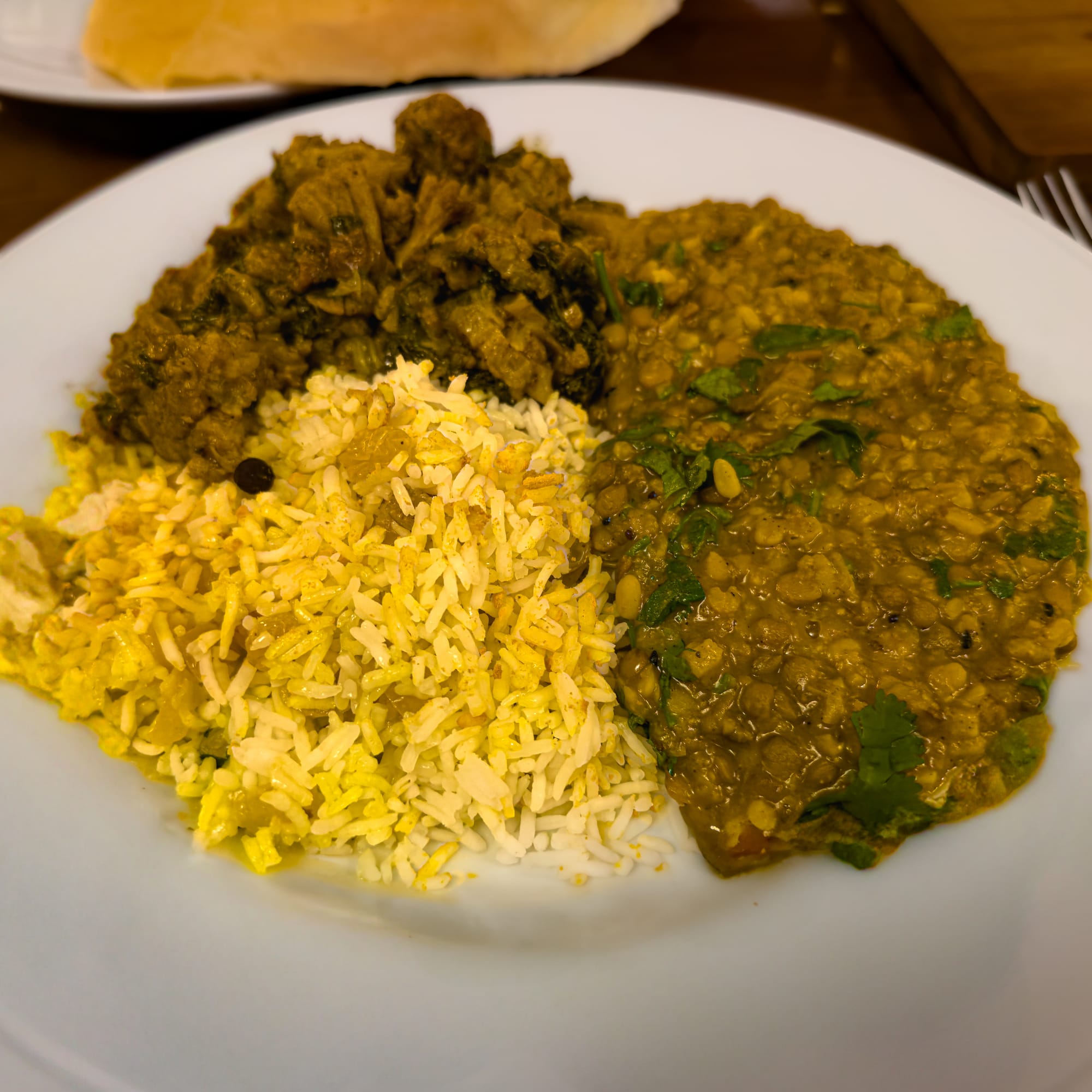
Curry night is no casual affair. James takes it seriously, importing high-quality spices and putting together a buffet-style feast that usually includes six or seven different dishes. About half of the spread is vegan, which makes it one of the few occasions in Bansko where you’ll find multiple plant-based options that are as rich in flavor as they are plentiful. From fragrant dals and vegetable curries to spiced rice dishes and chutneys, everything is cooked with balance and depth that reflects time, practice, and passion.
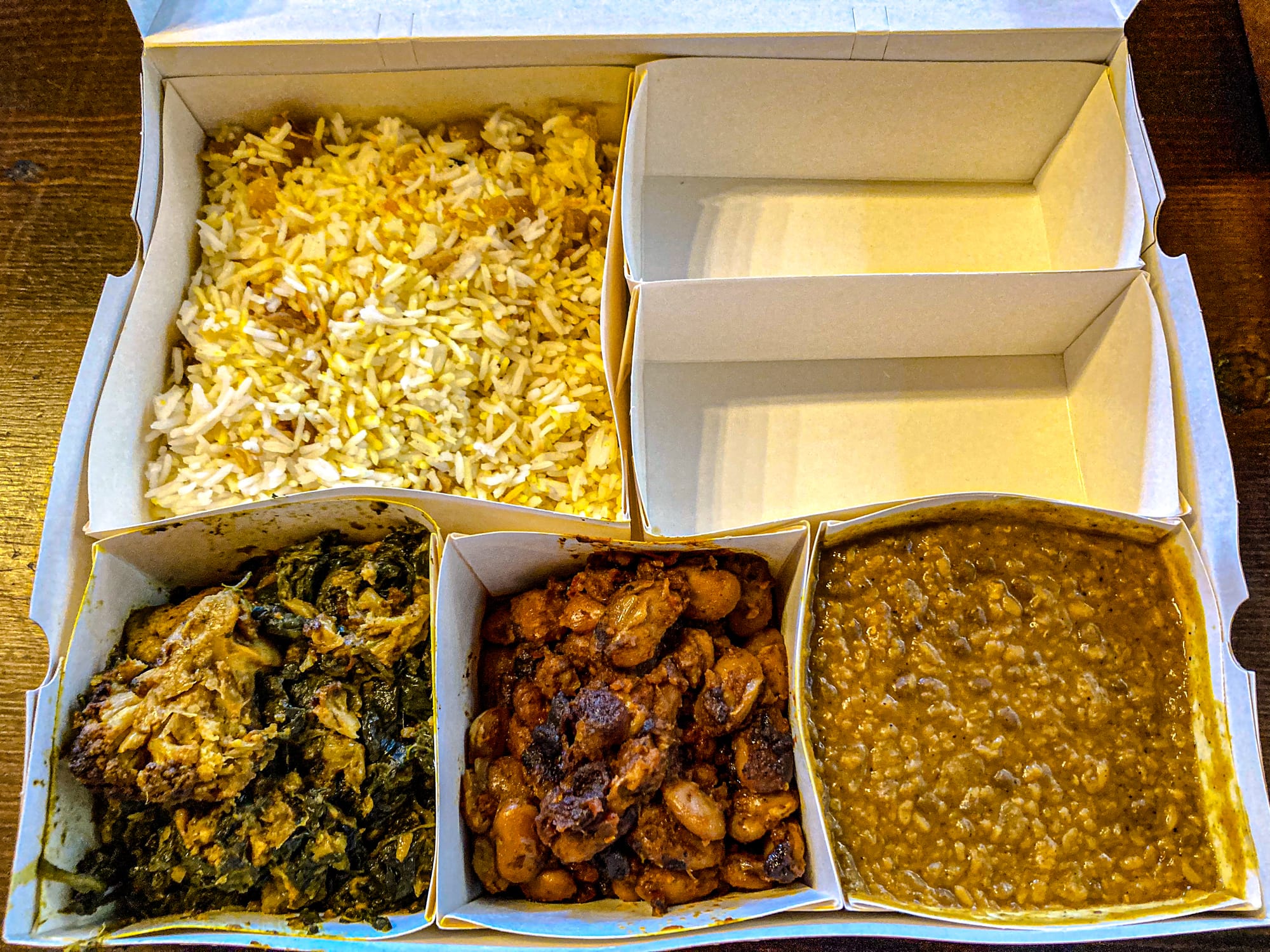
What makes the event even better is that it’s not limited to those staying at The Avalon. James usually posts in the broader WhatsApp community, and anyone can reserve a spot to join. It’s a social evening as much as it is a meal—tables filled with locals, nomads, and travelers all digging into the same pots, sharing stories between spoonfuls. For us, curry night ended up being the best food we had in Bansko, not only because of the flavors but because of the atmosphere: communal, welcoming, and deeply satisfying.
Eating vegan in Bansko
Bansko is not an easy place to be vegan. Unlike other nomad destinations, plant-based food here isn’t woven into tradition or flourishing in trendy cafés—it’s more of a patchwork you stitch together from what’s available. Eating vegan in Bansko requires patience, lowered expectations, and a bit of creativity. You won’t find abundance, but you will find a few bright spots.
Places like Lubanitza, Chalet Yanitza, and The French Guy offer some intentional plant-based options that make daily life a little easier. Traditional Bulgarian staples like bean soup, vegetable sach, potatoes, and lutenitsa can anchor meals at almost any mehana. Grosh and the Sunday market help stock your kitchen, while eBag fills in the gaps with specialty vegan products. Summer brings its own delight in the form of foraged fruit, and Avalon’s curry night is proof that even in a meat-heavy town, great vegan food is possible.
Eating vegan in Bansko isn’t about variety or novelty—it’s about finding enough to sustain yourself while enjoying what the town is really known for: the mountains, the hikes, the skiing, and the community. For nomads and travelers, Bansko is a place to live simply, cook at home, and take joy in the small wins when you do stumble across something unexpected, like a vegan banitsa or a raw cake.






